

How to Become a Yacht Captain- An Expert’s Handbook
Do you want to become a yacht captain? Having watched my husband climb the ranks over the past 12 years, I have first-hand experience of seeing what it takes to become a yacht captain.
We started working on a small catamaran in the Seychelles, and today, he is the successful Captain of a world-traveling 50m super yacht.
Becoming a yacht Captain requires a significant investment of time and money, but the reward of commanding your own vessel and crew is immeasurable.
Let’s explore what it takes, including the salaries, necessary skills, and certifications.
Table of Contents
Job Description of a Yacht Captain
The Captain of a superyacht is responsible for the safe navigation of the vessel, the safety of the crew onboard, as well as protecting the environment.
They are the primary source of communication with the yacht owner, guests, and management company.
They also handle all the daily operations of the yacht, including crew management and safety training. The Captain deals directly with management companies, port control, maritime legislation, budgets, accounting, and human resources.

Yacht Captain Salary
The below super yacht Captain salary guideline is based on my personal research using an average of over 10 major yachting platforms:
- 20m-30m: $4000-$7500 p/m
- 30m-40m: $5500-$9500 p/m
- 40m-50m: $8000-$15000 p/m
- 50m-70m: $13000-$19000 p/m
- 70m+: $16500+ p/m
Additionally, with longevity a yacht Captain can also expect to see discretionary annual raises and bonuses.
If they work on a Charter Yacht there will also be charter tips received averaging $2500-$5000 per week of chartering.

Roles and Responsibilities of a Yacht Captain
The job of a Yacht Captain can be compared to that of a CEO, CFO, and COO of a large corporation. The responsibilities are huge.
On a smaller vessel of 35m or less, the captain will need to be more hands-on, and they will likely also be the engineer of the vessel.
However, as the vessel size increases, you will have larger teams and heads of departments to assist in delegating tasks.
Roles and Responsibilities
- Crew Management and training
- Hiring and dismissals of crew
- Human resources
- Accounting and budgeting
- Safe navigation of the vessel
- Safe navigational planning
- Marine and environmental protection
- Vessel maintenance – planning yard work and refits
- Owner and guest liaison
- Planning of guest trips and itineraries
- Ensuring the yacht is compliant with maritime law
- Ensuring the yacht is compliant with all flag state safety regulations
Soft and Hard Skills
When it comes to the question of how to become a yacht captain, besides the required licenses, it is essential to hold certain soft and hard skills:
- Strong leadership skills
- Team management
- A quick thinker and problem solver
- Calm under pressure
- Exceptional communication skills
- Diplomatic in decision-making
- Excellent boat handling skills
- Navigational skills
- Administrative skills
- Organizational skills
- Computer literate
- Strong understanding of maritime legislation

Mandatory Certifications for How to Become Yacht Captain
The license required when identifying how to become a Yacht Captain is dependent on the size/tonnage of the vessel they wish to drive.
Your entry-level Captain license is the Yacht-Master 200 ton. This allows you to drive a vessel of under 200 tons, which is approximately 35m/100ft.
From there, with enough sea time and experience, you can move up towards the Master 500 and then Master 3000 tickets.
If you were to start from scratch, you would first want to look at how to become a deckhand . This will give you all the information and guidance you require before you get to the point when you are ready to start your master’s licenses.
Here is the order in which you would complete your courses:
- ENG1 Medical
- Efficient Deckhand (EDH)
- Yacht-Master Offshore (200ton)
- Yacht-Master Ocean (200 ton)
- OOW (Officer of the Watch)
- Chief Mate 3000
- Master 500 ton
- Master 3000 ton
Yacht Master Offshore 200 ton Limited
Holders of this certificate can Captain a yacht up to 200 gross tons and must be within 150 nm from a safe haven whilst doing so. This course is also required to legally stand watch on a vessel of up to 500gt.
The course consists of theory and practical work and takes 13 days to complete.
Pre-requisites for Yacht Master 200t Limited:
- 3,000 nautical miles while cruising at sea
- 50 days at sea as an active crew member
- 5 days as skipper on vessels less than 24m LOA
- 48 hours on watch at night underway as an active member of a yacht’s crew. During at least six hours of this nighttime experience, the candidate must have acted as the vessel’s captain or watch leader.
- A GMDSS-compliant Marine Radio Operator’s Certificate such as the RYA Short Range Certificate or higher
- All qualifying sea time must be within 10 years prior to the exam

Master of Yachts 200 ton Ocean Unlimited
This certificate allows the holder to be in charge of a commercial yacht of up to 200 gross tons on unlimited voyages.
This comprehensive six-day course on celestial navigation is designed to equip future yacht Captains with the knowledge necessary to navigate the globe using a sextant and air navigation tables.
Additionally, it will enable them to plan, undertake, and manage an ocean passage with confidence.
Pre-requisites for the Master 200 ton Unlimited:
- Before enrolling in the course, candidates must have completed two voyages of 250 miles each or one voyage of 500 miles. The majority of the journey must take place out of sight of land, which means being at least 20 miles away from the shoreline.
- For the qualifying voyage, it is expected to create a passage plan that can be reviewed during the course.
Officer of the Watch (OOW)
In order to obtain the MCA Officer of the Watch (Yachts Less Than 3000 GT) Certificate of Competency, candidates must complete seven distinct modules. These modules are designed to prepare candidates for the MCA oral exam.
Pre-requisites for the OOW:
- IYT Master of Yachts Limited certificate
- A minimum of 250 days of actual sea service
- 115 days can be either sea service, stand-by-service or yard service
- A Completed MCA approved training record book
The 7 modules include:
- Navigation and Radar (15 days)
- General Ships Knowledge GSK (5 days)
- Proficiency in Survival Crafts and Rescue Boats/Advanced Sea Survival (3 days)
- Human Elements and Leadership Management HELM (3 days)
- Global Maritime Distress and Safety Systems (GMDSS)
- Efficient Deckhand EDH (5 days)
- Electronic Chart Display and Information ECDIS (5 days)
- MCA OOW Deck Oral Prep Work (12 days)

Chief Mate 3000GT
After obtaining the Officer of the Watch certification for yachts less than 3000gt, you can apply to the MCA for the endorsement of the Chief Mate (Yachts less than 3000gt) Certificate of Competency. It is possible to apply for both certifications at the same time.
Course Modules include:
- STCW Advanced Fire Fighting (4 days)
- Proficiency in Medical First Aid (4 days)
- Human Elements of Leadership Management – Management level (4 days)
Master of Yachts (500GT)
This certificate is required in order to Captain a yacht of up to 500 gross tons.
Requirements for the course:
- 12 months as a watch-keeping officer with an OOW Certificate
- A valid ENG1
Modules include:
- Stability (5 days)
- Business and Law (5 days)
- Navigation and Radar with ARPA Simulator (10 days)
- Seamanship and Meteorology (5 days)
- Celestial Navigation Refresher and Exam (5 days)
- Proficiency for persons in charge of medical care onboard a ship (4 days)
Master of Yachts (3000GT)
This certificate is required in order to Captain a yacht of up to 3000 gross tons.
The modules for the Master 3000GT are the same as that of the Master 500. If you pass all the modules and have met the requirements for the Master 3000GT, you can skip the Master 500gt Course and do the exam and oral for the Master 3000GT.
Requirements include:
- including not less than 240 days watch-keeping service whilst holding an accepted OOW Certificate of Competency (CoC).
- All of this service must be completed in vessels of 15m or over in load line length and include 12 months in vessels of 24 m or over in load line length, or 6 months in vessels of 500gt or more.
- A valid ENG1 Certificate
Final thoughts
Most crew don’t anticipate the significant amount of time and money it takes when wondering how to become a yacht Captain.
My advice to you is to start logging your sea time from the very beginning and plan ahead. You don’t want to miss out on opportunities due to not having the required license.
If you are still looking for more detailed information or if you are looking to book a course, head over to the PYT website. They are an MCA compliant training facility with schools in Fort Lauderdale and South Africa.
Good luck on your journey. I hope to see you out in the big blue ocean commanding your own vessel one day.

Hi, my name is Lisa, a Chief Stewardess in the yachting industry with 10 years of experience, as well as 8 years of hospitality experience prior to that. Being in the yachting industry has been a whirlwind of adventure, growth, challenges and some of the best experiences of my life, and I am excited to share my knowledge and experiences with all of you.
Essential Guides
Ocean Mapping
New to Yachting
Yacht Captain jobs
Your new adventure awaits.

Photo of Captain Sally-Ann Konigkramer
Explore more yacht roles
Other essential guides.

Mandatory certificates

What you need to know about B1/B2 visa

Download yacht crew CV templates

How to write a memorable yachting CV

How to prepare for a yacht interview?

What are the two main yachting seasons?

Big yacht crew hubs you should know about

Is yachting the right choice for me?

Yacht crew salary guide
Leading from the helm as a Captain is undoubtedly one of the most fulfilling and rewarding career paths in the superyacht industry.
The Captain holds the most senior position onboard a yacht and the one responsible for the overall operation of the yacht, the safety of its crew, owners and guests. It’s an all-encompassing position where excellent navigational capabilities are coupled with a high level of administrative and managerial skills.
The role differs depending on the size of the yacht, its usage and its cruising itinerary. Captains on smaller yachts need to be hands-on problem solvers and multitaskers. Under 35m, for example, the Captain’s position also encompasses the role of an Engineer, whilst on larger yachts the Captain has dedicated teams and Heads of Departments under their command.
What does a yacht Captain do? | Yacht Captain Job Description
Commanding the yacht and navigating safe passages across the oceans is just a small part of a Captain’s job. A yacht Captain is also in control of overall safety, crew management, budgeting, administration, refit projects, voyage planning and adhering to all international maritime regulations (ISM, MARPOL, SOLAS).
The responsibilities of a yacht Captain include:
Safe navigation and operation of the yacht
Ensuring that the yacht is in all respects compliant with the relevant laws and regulations
Ensuring that the yacht is prepared for annual flag surveys, annual class surveys and port/flag state controls
The setting of budgets and budget management
Hiring, leading, appraising and dismissal of crew
Overseeing the maintenance of the vessel
Ensuring legal and regulatory compliance
Managing yacht refits and surveys
Managing fuel costs and dockage fees
Being an ambassador for the yacht, hosting and entertaining guests as required
Voyage planning
Soft and hard skills required to be a yacht Captain
Successful Captains are excellent leaders, able to set a common goal for their crew and able to communicate with owners, guests, crew, contractors and brokers alike.
The skills of a successful yacht Captain include:
Excellent leadership, management and diplomacy skills
Excellent yacht handling and navigation
Ability to stay calm in difficult situations
Good grasp of finance and legislation
Excellent communication and interpersonal skills
Organisation and administration skills
How to become a yacht Captain?
Maritime training and sea-going experience is required. Positions are qualification based, from a Master 200, Master 500, Master 3000 and up to a Captain Unlimited. Training may be completed in a National Maritime Academy, a university or a specialised Sailing School.
Mandatory certificates needed to work on board a yacht
All crew members regardless of position and seniority need to have a valid STCW Basic Safety Training certificate, along with a recognised Seafarers medical certificate, the most popular being the ENG1 which is issued by an MCA (Maritime and Coastguard Agency) professional medic.
Without these two certificates, it is not possible for crew to work on board a yacht and a Recruiter will not be able to assist you in finding work onboard a yacht. For more information about mandatory certificates please visit our Mandatory Certificates Guide .
Are you ready to secure a Captain position on board a yacht?
Become a member of YPI CREW and connect with our recruiters so they can guide you through your job search.
Each of our recruiters is specialised in crew placement for a particular department and they will do their best to get you an interview on board a yacht. They will also advise you on how to best present your experience and skills and prepare for a yacht job interview.
YPI CREW TEAM
Ypi crew recruiters in charge of captain recruitment.

Ulrica Lindström
Head of Captain and Officer Department

Captain and Officer Recruitment Specialist

Caitlin Sorrell
Let’s get started. call us on +33 (0)4 92 90 46 10 or email us., our mission, vision and values, mlc 2006 compliance, essential guides, yacht crew positions.
Chief Officer
Second Officer
Third Officer
Chief Engineer
Interior Crew
Head of Service
Head of Housekeeping
Specialist Positions
Spa Manager
Spa Therapist
Personal Trainer & Yoga Instructor
Hairdresser
Mandatory Certificates
B1/b2 visa information, how to write a memorable cv, how to prepare for an interview, yachting seasons, yacht crew salary guide, is yachting the right choice for me, cv templates, ocean mapping, new to yachting.
+33 (0)4 92 90 46 10

How to Get Your Captain’s License –A Step-by-Step Guide
From captain requirements to the coast guard application process – how to navigate the process of becoming an official boat captain.
Like all other areas of professional endeavor, getting a Captain’s license is an essential and non-trivial process. Despite the years between my earliest thoughts on having one and actually applying…or perhaps because of that time…I am quite proud to call myself Captain !
From the time I was Quartermaster aboard the Chesapeake Lightship back when she was berthed in Washington, DC, I had wanted to get my Captain’s license. We in her crew had plenty of sea time. The late Capt. Joe Murray, John Hart, and particularly Chris Krusa saw to it that each of us developed our skills and knowledge beyond the minimum that we needed for our jobs. We met collectively with a Coast Guard officer to explore the options for us all getting licensed; however, the wind was taken out of our sails so to speak when he told us that since most of us were not 18, we were not entitled to take the written exam.
I left that session crestfallen but I put it all behind me as I moved on with a career in research physics. Later, I learned that what the officer SHOULD have said is that if we had just waited (a few months) until we turned 18, we could have taken the exams. Years later, my problem was that I could not meet the requirement to have 90 days of sea time in the last 3 years. My employer would have more than frowned on my having been gone so often. And all of us had not even bothered to ask for sea service forms or letters to document our time on the Chesapeake.
Fast forward 34 years and serendipitous events led to my being able to get signed sea service forms for my time on the Lightship. Shortly thereafter, I became a boat owner WITH vacation time afforded to a very senior engineer in the company.
Long story short, I am Capt. Rob Chichester – 200 Ton Master with Auxiliary Sail and Assistance Towing Endorsements.
Navigating the path to a Captain’s license can be full of the brambles of regulations, forms, and oddly worded requirements. In this article, I will try to clarify the process and help interested skippers decide what type of license, scope, and tonnage they should pursue. Then I will discuss the application process and all the elements needed to assemble a successful license application package.
More Resources: If you would like a one-on-one consultation to have your specific questions answered on this topic or others related to boating, please sign up for 30 minute video consultation with me!
The Basics of a Captain’s License
A first time applicant will need to decide while type of license to pursue. There are two types available to one applying for a new license.
- You may apply for a license to be an Operator of Uninspected Passenger Vessel (OUPV) or the more familiar “Six Pack” license. It is so called because the holder of this license is limited to carrying no more than 6 paying passengers on any vessel within his tonnage rating regardless of the maximum capacity rating for the vessel.
- The other option is a Master’s license which allows you to carry up to the maximum number of passengers indicated for the vessel in question. Whereas a Master’s license requires US Citizenship, an OUPV license holder can be non-US citizen. Clearly holding a Master’s license offers more opportunities; however as I will explain later, the knowledge requirements are appropriately greater.
The scope or route for one’s license is the waters in which you are authorized to function in your licensed capacity.
There are effectively three such areas defined:
- The first is Inland which covers all inland rivers and bays not otherwise outside the demarcation line for the high seas. This may also include portions of the Great Lakes up to the International boundary line. (I will not explicitly discuss the Great Lakes or Western Rivers in this article but those waters are also covered by an Inland scope with a specific endorsement for each.)
- The second route is near-coastal which means ocean waters not more than 200 miles offshore. By extension, a near-coastal route endorsement includes inland waters as well.
- Lastly, Oceans refers to all waters seaward of the Boundary Lines as described in 46 Code of Federal Regulations (CFR) Part 7.
Tonnage rating is determined by the size vessels upon which an applicant has served. The tonnage is not simply the weight or displacement of a given vessel. It is not how much stuff you had loaded on a boat. It is a calculation of theoretical displacement if the complete available interior volume of a ship were filled with material of density 1 (i.e., water).
There are formulas available to estimate that based on the dimensions and type of boat. The calculations are necessarily different for a sailboat and a power boat. On a very rough order of magnitude, a 100 Ton powerboat would be about 80 feet long and a 100 Ton sailboat would be about 100 feet long. The tonnage rating is a not to exceed limitation.
One need not necessarily serve on a 50 ton or 100 ton vessel to earn the equivalent tonnage rating (see the table below for specifics on that). One cannot be granted more than a 100 Ton rating on an initial license because higher tonnage requires that one has served in a licensed capacity before applying for the higher tonnage. When I renewed my license in November, I applied for a 200 Ton rating which was granted conditional to my successfully passing the mandated written test. By the time you read this, I expect to have taken that exam.
Tonnage and route are determined by one’s documented experience. While you may apply for a 100 ton rating, you may only be granted 50 tons (or less) if your experience does not justify the higher rating. Additionally, the greater the scope, the more sea time is required to qualify for the rating.
For example, while an Inland scope needs 360 days of total sea time with 90 days in the last 3 years, a near-coastal scope requires 720 days and again the 90-day recency requirement. The take-away here is that experience is a big determinant and should NOT be discounted in any way. Note that there is no path to being granted an Ocean scope except by being a licensed mate or master for at least 2 years with documented service on those waters. That is, it is impossible to apply for an Oceans scope on a first application.
It should be noted that an OUPV license is automatically issued with a 100 Ton rating. As coarse as this may sound, the reason is that it is assumed that with an OUPV license, the most damage one can do is to 6 people. Therefore, there is no particular benefit to issuing OUPV with varying tonnage ratings. New Master’s licenses are issued with ratings of 25, 50, or 100 tons. Discussions of ratings over 100 tons or Ocean routes are beyond the scope of this article. You may contact the author if you wish more information on those specific topics.
The table below is a guide to determining for what rating one may qualify.
Your Sea Time Experience
For a Near Coastal route, ideally, all of your time will be on Near-Coastal waters; however, you are allowed to substitute up to half of the 720 days required minimum with Inland route service. For the purposes of documenting sea time for a Near Coastal route, any time served beyond the 3-mile limit counts for that purpose. So if you charter in the Caribbean or crew on an offshore fishing trip, that time counts.
Just to be clear, sea time is not counted unless you are a working member of the crew of the vessel named on the sea service form. That is to say, just being a passenger is not sufficient.
To keep things on the up and up, the applicant is required to get the signature of the owner, manager, or master of the vessel on the sea service form. If the applicant owns the identified vessel, proof of ownership must accompany the form. Proof might be a Bill of Sale, vessel document, or a state registration.
Sea time is not counted unless you spend at least 4 hours of a given day underway . Being onboard the boat at the dock swabbing the decks does not count. Time underway is counted whether it is in route or adrift. Being anchored or moored also does not count. It can be tedious to collect and collate all of your sea service forms, especially after the fact. My best advice is even if you are only thinking about getting a license, keep blank sea service forms with you for the vessel operator to sign at the end of a trip. Note that the forms are not per trip but per vessel. There is room to document up to 5 years of sea time on any given vessel. There is room for five years of data because your license will be up for renewal every 5 years .
Technically, vessels over 200 gross tons now require a Service Letter from the employer or vessel manager. However at the time I applied for my original license, I submitted my time on the Chesapeake Lightship on a Sea Service form (CG-719S). That form was accepted for that as well as again when I renewed and requested an upgrade to 200 Tons. I may have been grandfathered so new applicants should verify their individual situations with the National Maritime Center .
Health and Medical
To be a Captain, one must be in good health and of reasonable physical ability. The Medical form ( CG-719K ) is the most extensive form one will need to complete. It also requires the signature of a licensed physician. Unlike an FAA pilot’s license, the physician need not be approved by the US Coast Guard. Your family doctor is acceptable.
For my part, I completed as much of the form as was reasonable. I then FAXed the form ahead of my annual physical so that the doctor could review what was needed and to be prepared to sign off on it. The only extra thing the doctor had to do was conduct color vision and standard wall chart vision test. Your vision need not be perfect without glasses but if that is the case, you should expect a requirement to be written on your license requiring corrective lenses to be used and a spare pair to be available when on duty. If your medical form is accepted, you will be issued a separate medical form which is to be kept with your Merchant Mariner Credential. There is a pocket on the back cover to hold it and the required Transport Worker’s Identification Card ( TWIC ). The TWIC will be addressed below.
Another form to be completed, this time by an authorized physician, is the DOT five-panel drug test . An applicant must submit proof of drug testing with no findings as determined by an authorized physician. Also be aware that to work aboard any vessel in any compensated capacity, you must have proof of participation in a drug test program, whether it be one in which you elect to participate as an individual or one required by your marine employer. Such proof is to be carried with you at all times just as your license and medical certificate must be. It is generally in the form of a letter attesting to your compliance and passing a test within 12 months of the date of the letter.
Criminal and National Security Background
One has always been required to agree to a criminal background and driving record check . As you can well imagine, adverse findings in either of these areas will negatively affect one’s application.
With the creation of the Department of Homeland Security (DHS), a requirement was added that licensed mariners have a TWIC card . In fact, anyone working in the transportation sector (air, rail, marine, trucking, etc.) is required to have a TWIC card. You will be investigated for any evidence of threat potential to national security. This is because as a licensed Captain, you may have access to vital and strategic marine facilities.
The TWIC card is issued by DHS through a federal contractor. There is an application to complete and a fee to pay. Furthermore, you must appear in person so that your photo and fingerprints can be taken. This bio-metric data is stored on the TWIC card and protected by a pass code. You must submit a copy of your TWIC with your license application; therefore, one must start the TWIC process at least four to six weeks or more before submitting one’s license application.
Separately, a photograph of the applicant must accompany the application. This can be a driver’s license or passport photo . It should be a state or federal government issued document. Others may be accepted but the applicant should verify this with the NMC before submitting the application to avoid processing delays.
- Coastal Navigation
- Deck General Knowledge
- Rules of the Road
Deck General includes a wide variety of topics including fire and safety, terminology, and laws and procedures. Rules of the Road covers exactly what it says. Bear in mind that even if you are applying for an Inland or Near Coastal license, the Rules of the Road test will include elements of International Rules. So when you are studying, do not neglect to familiarize yourself with those details. There are some variations in vessel precedence, sound signals, and lights and shapes displayed by vessels.
If you are applying for a Master’s license, there are additional areas of test. The same is true if you are additionally requesting an endorsement for Sail, Auxiliary Sail, or Commercial Assistance Towing. The net effect is more questions overall.
You must score at least 70% in all areas except Rules of the Road for which you must have a minimum score of 90% to pass . Generally, that means you may miss no more than 3 questions to pass with a 90% grade. The Navigation questions will require you to work with a chart to plot position, routes, and so forth.
You may either pay an examination fee to take the exams administered by the Coast Guard or you may enroll in any number of approved Captains’ courses. You will receive a certificate of completion from the school to submit with your application in lieu of the Coast Guard exams; however, you will still take exams which include questions from the same list of questions that the Coast Guard uses. In the latter case, you will not need to pay an examination fee but obviously, you will have to pay a tuition for the course.
Completing your Application
The license application is not unlike many others. It is actually shorter than the medical form discussed earlier. There are two things to note on the application:
- Item 1 of Section IV describes how one may be asked to serve on behalf of the country in times of national emergency. An example of this was the massive sealift conducted in support of the first Gulf war in the 1980’s, Operation Desert Storm. This is a voluntary action. However it should be noted that during the call up for Desert Storm, more mariners were needed than responded. It is a possibility, particularly in these times, that another such national emergency could arise.
- Secondly, Item 5 of Section IV contains an oath to which an applicant must swear. If you present yourself in person you will be sworn in by Coast Guard personnel. If you choose to submit your application by mail or electronic means, you must provide proof that you appropriately took the oath as written. This generally means being sworn by a Notary or a local government official such as a county clerk.
Payment of all required application and examination fees is made online prior to submitting the application. You will receive a receipt which you should include with your application package. Pay close attention to the various fees and be sure you select all that apply but ONLY those that apply. An error either way will delay processing of your application.
Submitting your Application
When you apply for an original license and especially if you plan to take the Coast Guard exams , you will need to present yourself in person with your complete application package at a USCG Regional Examination Center (REC). Photo ID will be necessary as well.
One thing that happens if you appear in person is that you will raise your right hand and take the oath on the application. That was a very moving moment for me. Delivering your application package in person also allows you to interact with the personnel directly which could be very valuable if there are errors or omissions in your application package.
If you are not taking the Coast Guard exams and if you have been sworn by an authorized official, you may wish to submit your application by mail or electronically. Be aware that electronic submission has a limit on the size of the email attachment. My applications have always been larger than what is accepted by the Coast Guard mail servers.
Waiting for Your License
The Coast Guard has implemented a very good system of tracking your application and providing feedback at every step of the way. You will receive emails as the application moves through the system. It may take up to a week for the REC to review and forward your application to the National Maritime Center (NMC) in West Virginia. That was my experience with the New York City REC. It may be less in smaller, less congested venues.
By the way, you are not required to use the REC nearest to you. If you wanted to fly to Hawaii or Alaska instead of driving into Baltimore, you may do so. A good friend of mine drove from New Jersey to Boston to submit his application there because he heard the processing times were less than for New York.
Once the NMC has your package, the process usually will not take long at all. It is very likely you will receive 2 or 3 emails a day, often within minutes, as the application moves through the various approvals. Nothing beats the feeling you will have when you get the final email saying that you have been approved and your credential is being printed!
My original license took slightly more than two weeks from dropping off my application at Battery Park in New York to finding my MMC in my mailbox.
Once you get your license, look it over thoroughly. You may not necessarily have been granted the scope and rating you requested. Sometimes that reduction will be legitimate. Other times, it may be due to an honest mistake. Both my original and renewals had honest omissions. I was only granted a 50 ton rating on my original license when I had applied for 100 tons. I submitted the sea service form supporting the request for 100 tons after the fact and I received an endorsement sticker for the 100 ton rating a week later. Similarly with my renewal, I asked for an upgrade to 200 tons. My renewal was approved at 100 tons. When I contacted the NMC, they amended the approval and showed that I was then approved to take the required test for the 200 ton upgrade. So my message here is to not necessarily accept the delivered MMC as if it were carved in stone.
More Resources from Captain Rob
Being a licensed Captain is a great source of pride to me. I have enjoyed working with my clients as well as pursuing other commercial opportunities like relief captain jobs on various schooners, water taxi and tow boat jobs, and tour boat and ferry captain work. I look forward to many years of working on and enjoying the water.
If you would like a one-on-one consultation to have your specific questions answered on this topic or others related to boating, please sign up for 30 minute video consultation with me!

Recommended Reading
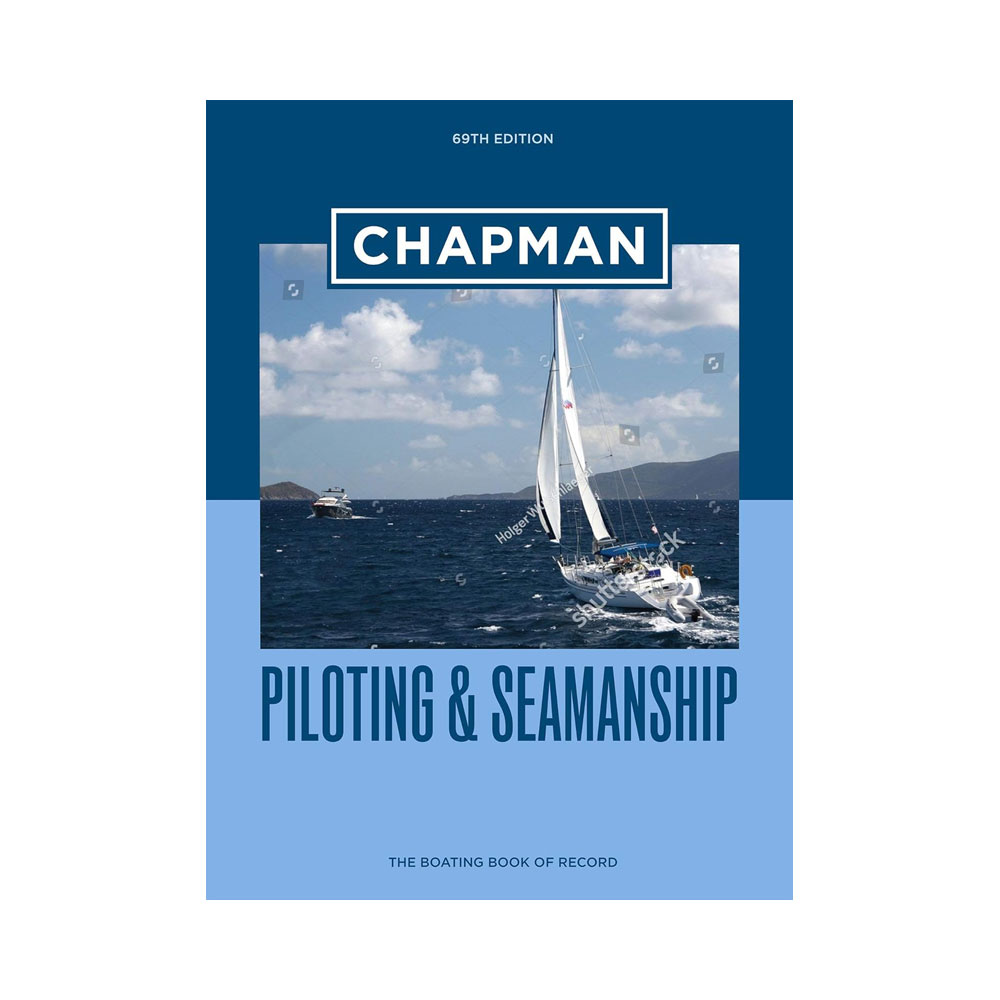
Chapman Piloting & Seamanship 69th Edition
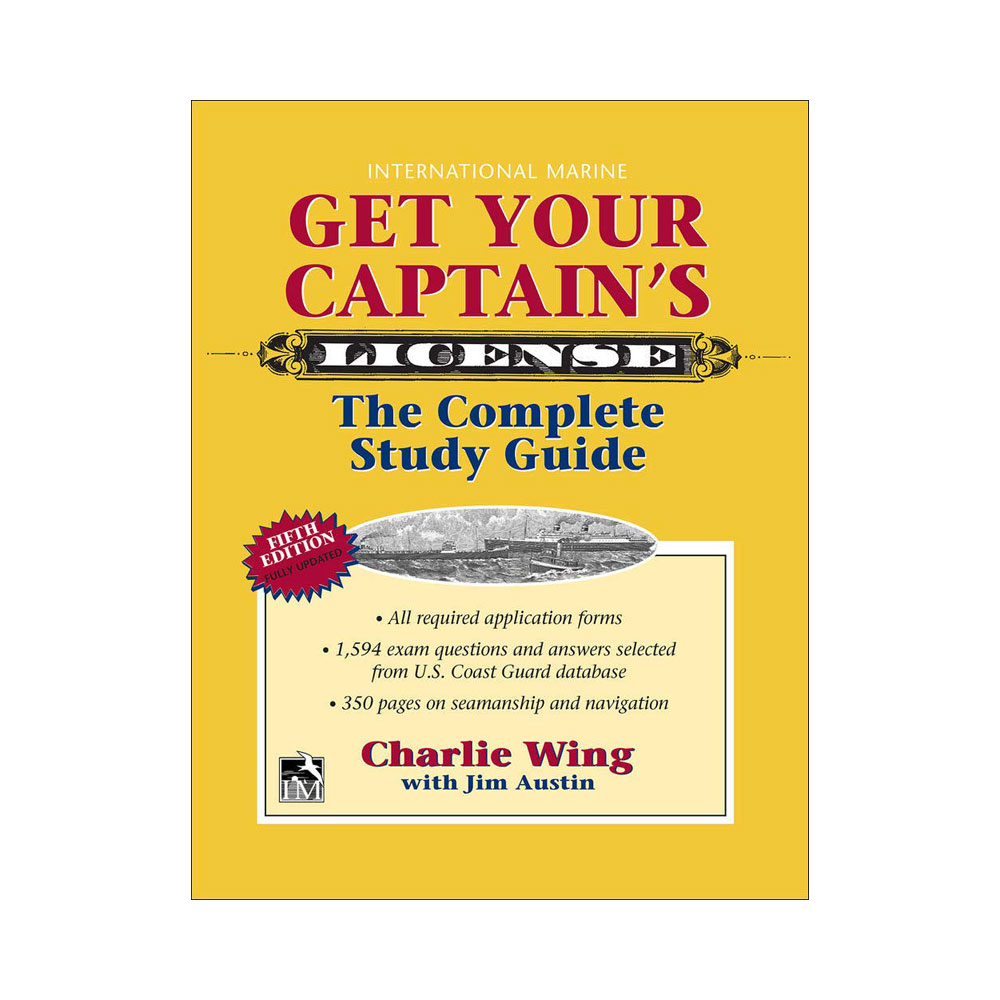
Get Your Captain’s License Study Guide
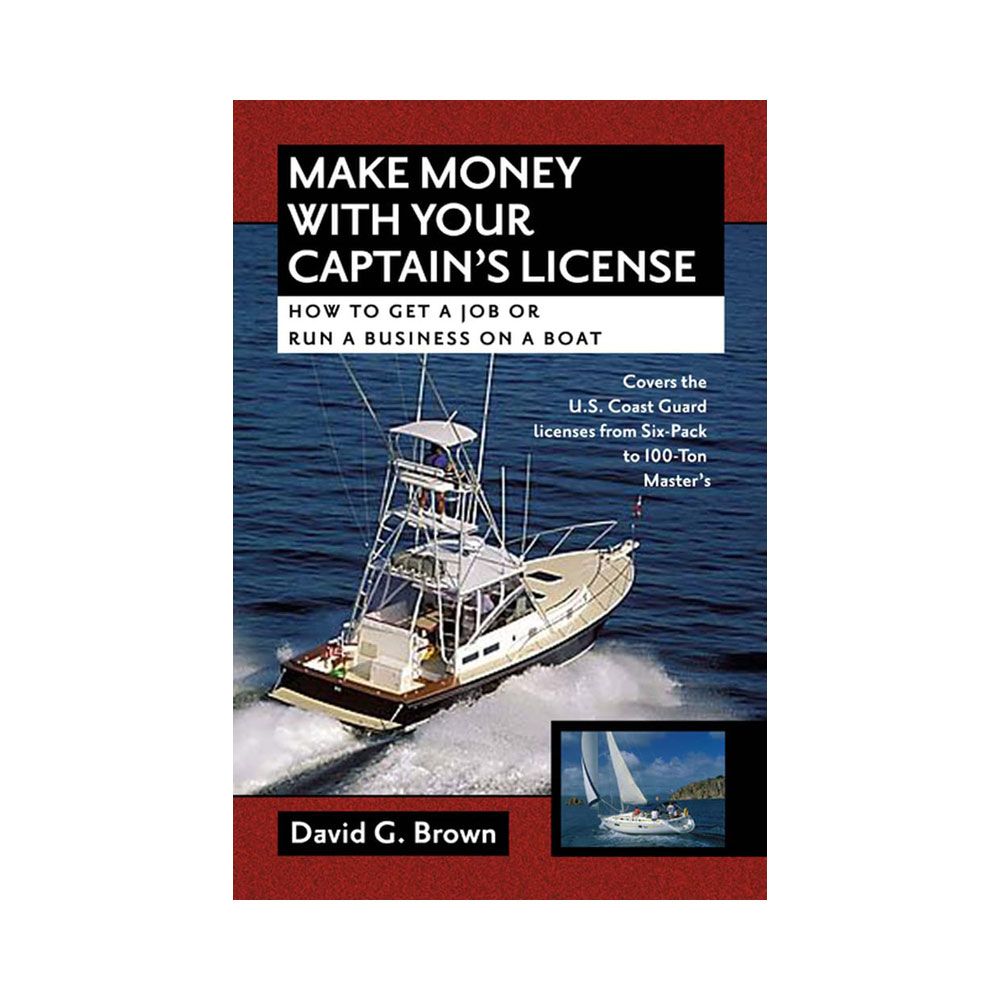
Make Money With Your Captain’s License Book
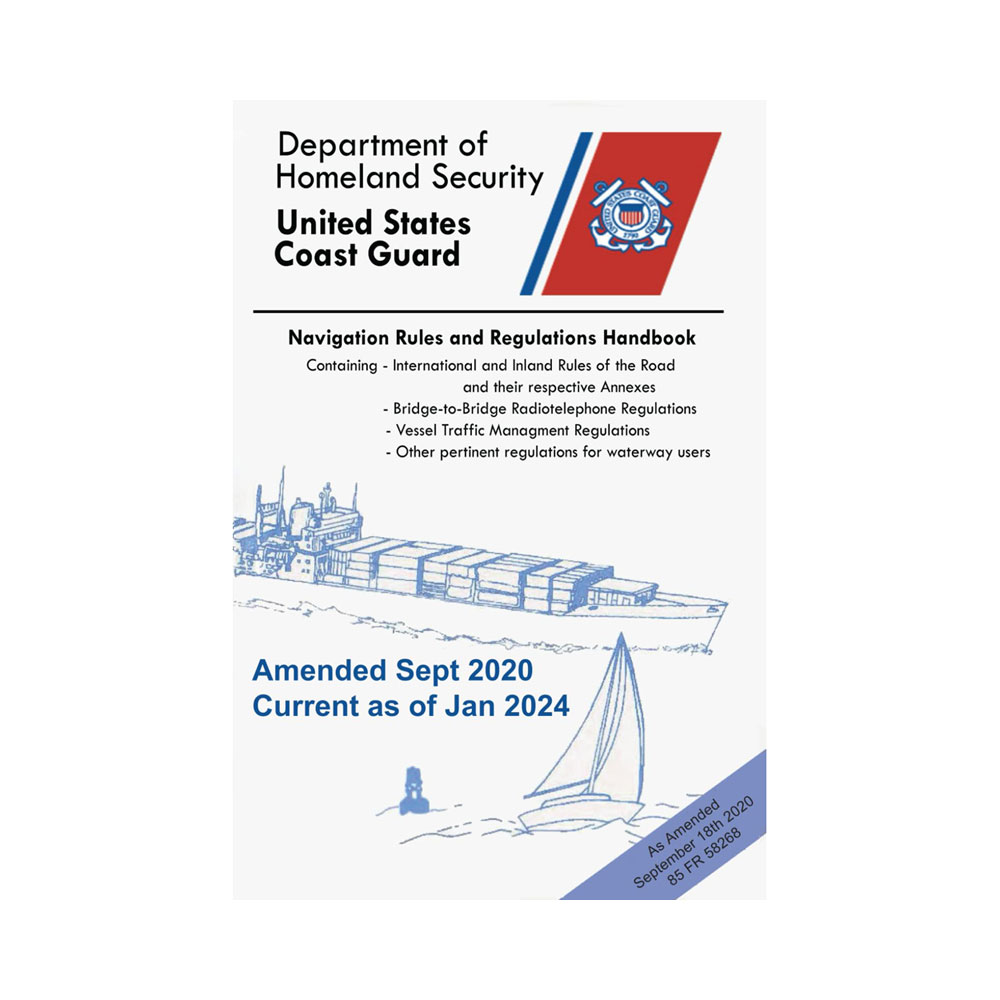
USCG Navigation Rules And Regulations Handbook
Love the boat life check out these picks for your boating lifestyle:.

My First Love is Boat Life Sweatshirt
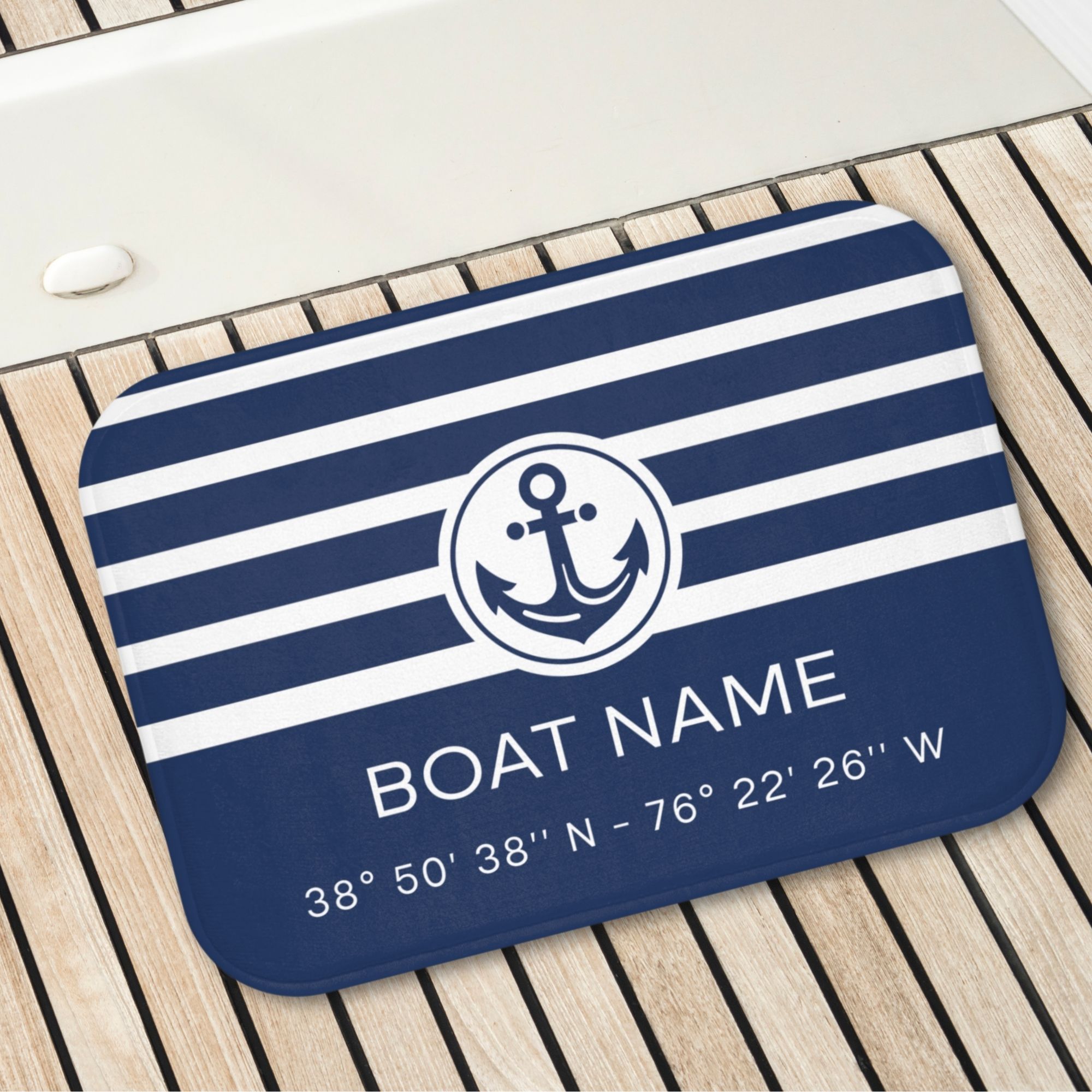
Custom Boat Mat with Boat Name & LAT LONG Coordinates
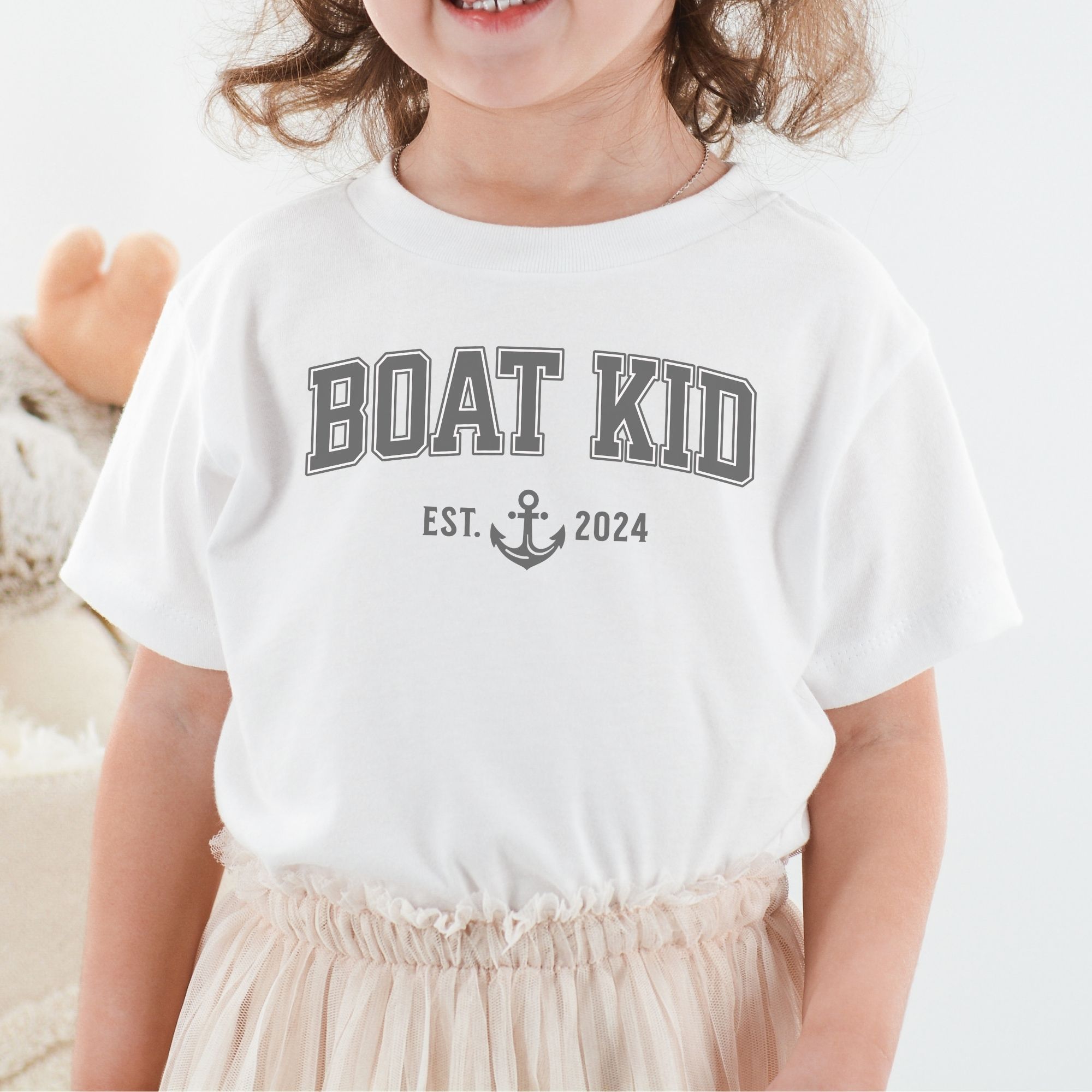
Boat Kid T-Shirt with Custom Year
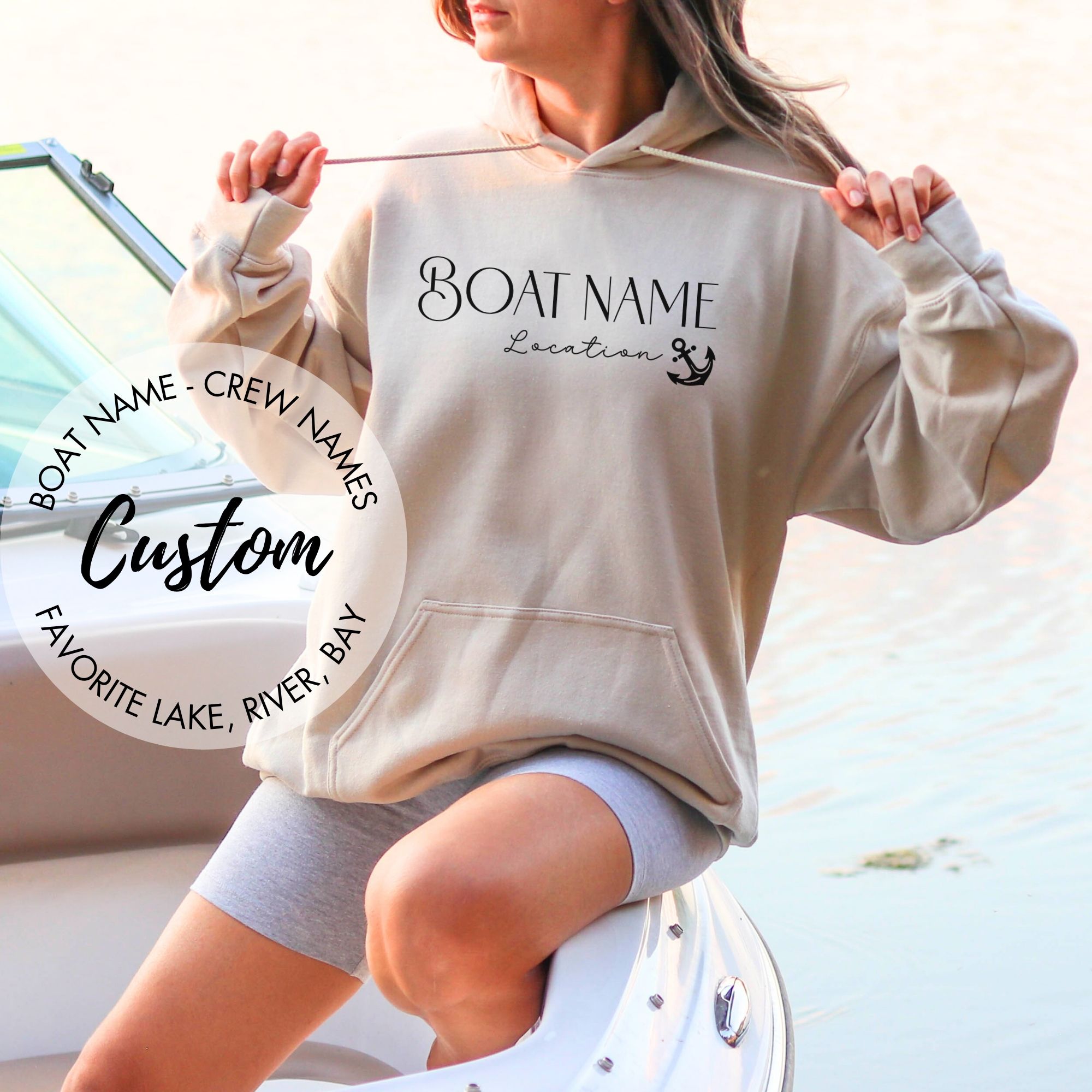
Custom Boat Name & Location Hoodie

Capt. Rob Chichester
Related posts.
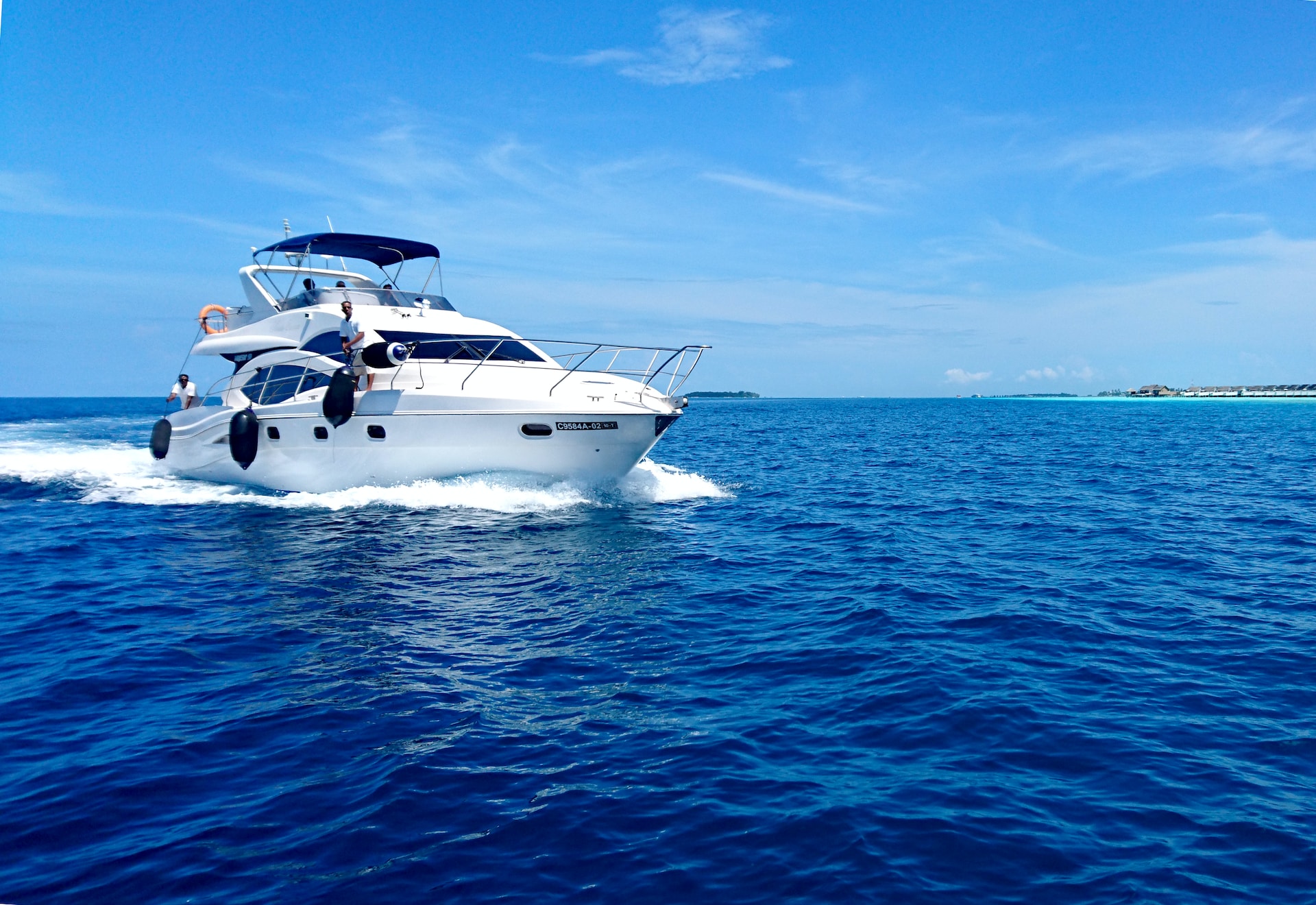
Can I Drive My Yacht Anywhere In The World?
May 11, 2023
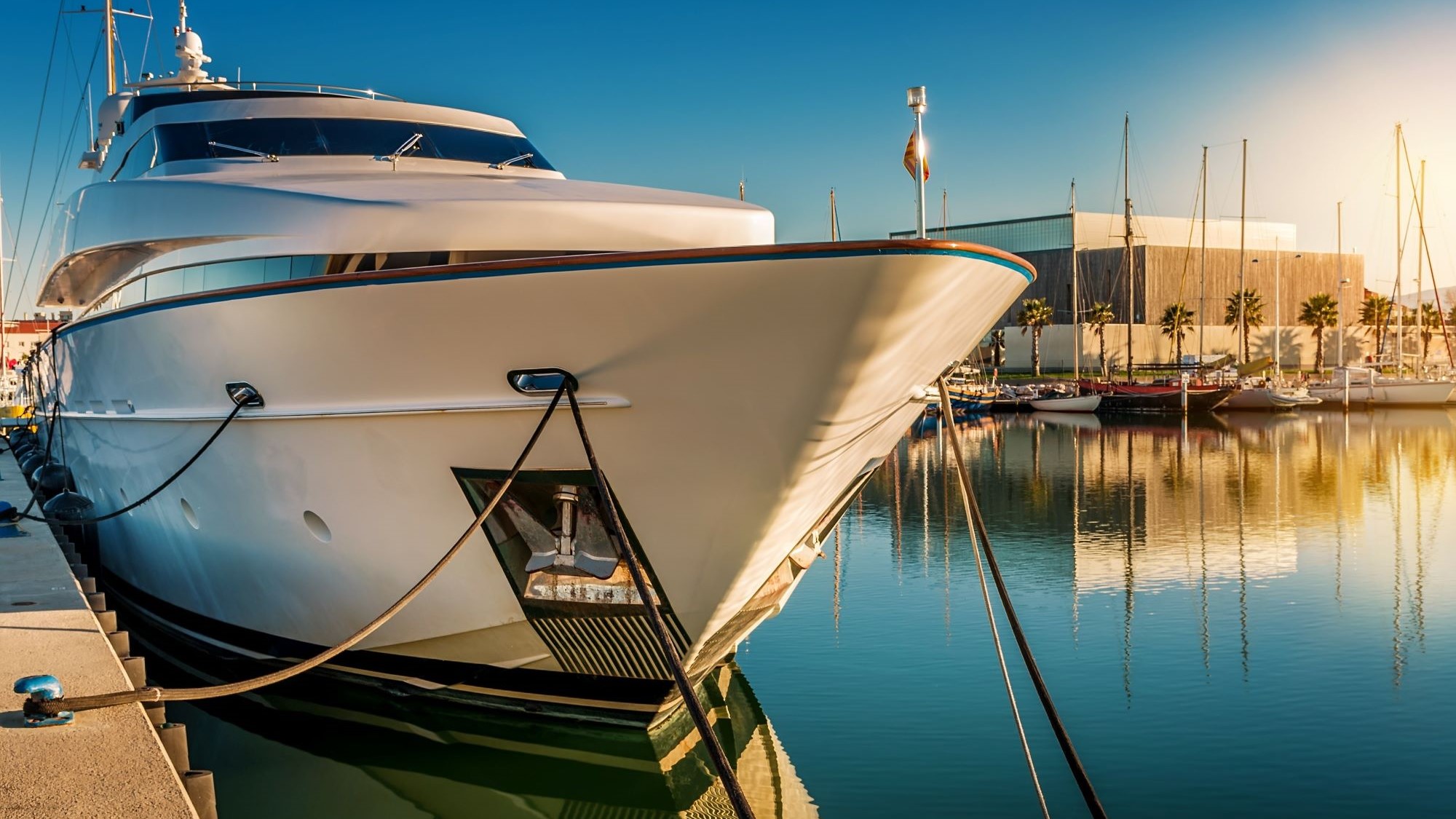
How To Transport A Yacht Safely
April 7, 2023
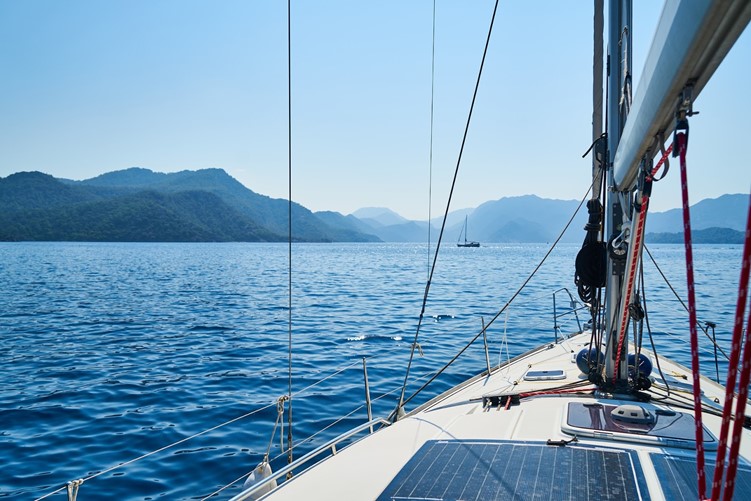
How Hiring a Captain Can Make You a Better Boater
May 29, 2021
24 Comments
Hi, I am hoping you can help me out. I am a USCG vet that was stationed at a small boat station in NJ from 1983-1989. I am trying to get my sea time documented but I am having a very hard time finding out how to do that since the station records were not computerized at that time. I have contacted the NMC and they told me to call the station to get an Abstract of Operations report. They just laughed at me when I called the station. I have requested info from vetrecs.archives.gov but I am sure that will take some time just to get an answer as to wether they can do that or not. I was wondering if you knew how to go about getting the information that I need. I am sure I am not the only person with this issue and I can’t seem to find anyone that knows exactly how to go about documenting that time.
Thanks Jeff

Thanks for your question. I don’t have a lot of advice for you regarding USCG internal procedures. Perhaps you can contact the Office of Personnel and try to get a copy of your service record. Alternatively, is there anyone at that small boat station who knew you? Would the OIC be willing to write a letter? The last and least likely option would be to fill out your own sea service form and see if anyone there would sign off on it for you. Now the regulations speak of a Certificate of Discharge being acceptable. See for example 46 CFR 10.232 ( https://www.law.cornell.edu/cfr/text/46/10.232 ). If you already have that, you might be good to go!
So…start with your Certificate of Discharge and if you don’t have that, then contact the Office of Personnel to see if you can get the requisite documents. Let me know how you make out!
Hi Captain Rob, My name is Elton the 66 year old owner of a small 35 ft. Kingscraft houseboat. I spend a lot of time on one large lake. It is an older wonderful all aluminum vessel but weighs only about 8000 lbs. In the chart the lowest weight rating is 17 tons. I would love to educate myself and become a Captain. Is that possible at some level? I would also have to document my own time as pilot.
Sir, you have open to you both options that I describe in my article. You could pursue either a Master’s license OR an Operator of an Uninspected Vessels license. From what you have written, I see no inherent obstacles. You must be able to document your seatime, get a medical evaluation, and pass the 4 or the 3 parts of the written exam depending on which license you choose to pursue. In any event, you would qualify for an Inland license. Your tonnage rating would also depend on which license you pursue. Solely based on what you have said above, you would qualify for a 50 ton Master’s license. If you pursue an OUPV, that comes with a tonnage rating of 100 tons. For most people, the biggest challenge is acceptably documenting seatime. (It needs all be as captain. You can include time served as master, mate, or crew but NOT as a paying passenger.) If your concern is your age, I know a few captain’s in the 60s and 70s. I am one of the former myself. Good luck!
Capt.Rob I am US Army Veteran And I was wondering if their was a school i could attend to obtain a licence, I ask this because i have to decide what i want to go to school for and this job would be a top pick for me. Any help on this matter would be greatly appreciated thanks
There are MANY captain schools that can help you with the written tests but there are NO schools that can help you with the sea time requirements unless you are considering enrolling in a maritime college like Kings Point or Fort Schuyler in the New York State university system. I used Mariners Learning System for my written tests only because it was more convenient than going to the USCG REC to take the exams.
Where would I get sea service forms . I have owned and operated my own boats for over 30 years and am now being asked to get a captains liscence
There is a link in the article for the National Maritime Center. All the forms you needs can be found on their website. Alternatively, you can search for USCG National Maritime Center with your favorite search engine.
Couple questions. Would working as a divemaster on a dive boat in the Gulf of Mexico count for near coastal sea time? And if you were to have 8 hours of sea time in one day, could you potentially count that as two days at sea? Or would it still be just one day? Thanks for all the info this has been a huge help!
Any time spent aboard a vessel underway counts as long as the owner, manager, or master of the vessel will attest to that. When submitting Sea Service forms, your option for your role aboard the vessel are things like crew, mate, master, engineer, etc. You will need to determine what your position was. Divemaster is not recognized and does not speak to maritime skills necessarily. (For example, you can dive from shore never having been in a boat.) Regarding the near coastal time, you just need to verify that the vessel upon which you served was indeed in near-coastal or ocean waters. The form has spaces for days spent within the specified boundaries and outside those boundaries. I once saw an interactive chart online for finding the boundary lines in a given area. For your purposes, you cannot count 8 hours as two days underway. You need a MINIMUM of 4 hours underway to count that day. Being at anchor or otherwise moored or secured does not count. Good luck!
Capt. Lots of good and helpful info. I boated the Chesapeake for 10+yrs, from the Delaware bay to Virginia in a 27′ cruiser. i’ve not been on the water since 2012. So to be clear, I need to acquire some time on a charter vessel to even attempt the basic “6-pack”. I have my CG boating skills and seamanship certificates,and will work on the CG719S. Living in Florida, lots of opportunity, should have done this sooner !! Thanks
Thank you for your feedback. I am glad you found the article helpful. Apart from documenting your sea time, I found the most labor intensive aspect was verifying that a) I had all the documents that I needed and b) I had correctly completely all of the USCG forms. A lesser challenge may be in determining what correct application fees are. If you are not sure, contact USCG NMC by phone, email, or online chat to get clarification on what fees you have to pay. Good luck!
This is great info..
I am starting out (hopefully) as a plan is due to new lifestyle i desire to get an two oceans open ocean 800 expedition catamaran (again very expensive so fingers crossed) but the plan is while the vessel is being built, i can take several classes and get a few certifications prior to launch, then as life you see everywhere on youtube for example have the vessel at dock, then day trips, then a week trip and just push it a little further until you are ready for the maiden voyage, really looking to live off anchorage in around the philippines / guam area mostly philippines or south pacific area, mostly friends and family but my question is any licence for that type of boat, and also if you have heard of any schools in the philippines? I know they have a few courses that are completely certified like any american school but a fraction of the cost, just curious if any particular licence i need to get or have?
You did not say whether you intended to take passengers for hire. Generally, one only needs to be licensed if you are getting paid to carry passengers OR if you working in more advanced maritime fields like tug boats and large cargo vessels. If you are only operating your private vessel for your own personal or recreational purposes, you usually do not need any kind of license other than possibly taking a multiple choice test on local safety rules and rules of the road. I am not familiar with the licensing requirements in foreign venues like the Philippines. Each nation has its own requirements. I was able to find information at this link: http://www.marina.gov.ph/policies/MCs/mc170.pdf . You may find some useful information in that document.
Good luck! And safe sailing…
Your information was helpful, thank you. I have decided to pursue getting my License but I am starting from scratch. Should I take classes before looking to get sea time? And how does one go about getting sea time with no experience?
Any course work you take will typically culminate in a certificate of completion. However that certificate will only be valid for 1 year. Therefore, do NOT take any exams more than about 6 months prior to submitting your original license application. As for sea time, you can look for marine work that does not require a license like deck crew on water taxis or excursion boats. Time spent on a friend’s boat counts. Have that friend complete and sign a sea service form. Sea time never expires and can be counted from the age of 15. Learn your rules of the road and learn to feel your vessel. Driving a boat is a lot different from driving a car. As a licensed captain, you are expected to step up to the helm and handle the ship with relatively little training time. Good luck!
Great article, thanks for writing it! Does time spent aboard a recreational boat that I own, when I am the only person aboard, count towards sea time? If so how do I document that – there’s no one to sign for the time. Thanks again.
Time spent on your own boat absolutely counts. You would sign the CG-719S Sea Service form yourself where it says Applicant AND where it says Person Attesting to Experience. However, you will have to provide proof of ownership for the vessel. The Bill of Sale is usually what is used but the vessel’s CG document or state registration card should also be sufficient. Remember that seatime is counted only from the age of 15 and it is underway time of at least 4 hours per day. Time on the anchor or alongside do NOT count. The presence of others is irrelevant.
Hi Shane. Sea time is defined as time working aboard in any capacity relevant to the rating you are pursuing. For instance, if you are a bos’n or deck crew, that time it unlikely to count towards a engineer’s license and conversely, time in the engine department or work on mechanical systems would be difficult to apply towards a deck officer’s license. The highest rating one can get on an original (i.e., first) license is 100 Ton Master. It is likely that your Navy time would count; however, your challenge is getting an appropriate service letter from the Navy. You cannot submit a CG-719S for your Navy service as that form is for SMALL VESSEL service. Consult the USCG site at http://www.uscg.mil/nmc for more information. Also note that you may use any valid sea time accrued from the age of 15. Good luck!
Hi Capt. Rob, I have one question rather just some clarification regarding the time at sea, for the tonnage rating. Does “time at sea” mean just that or does it mean operating the vessel. I was in the Navy for several years as an operations specialist and I am not sure what level I would qualify for if I were to pursue getting a Captains license. Also I was wondering how much the entire process would cost.
Hey Rob, Thanks so much for taking the time to write this, it was really very useful to read. This has been on my mind for some considerable time, but I am now finally starting on the road to getting my licence and taking a nautical shift in my career. I have been a sailor all my life, was sailing single handed as soon as I could walk and now own a 38 foot Irwin racer/crusier.
My one big question is online study vs going somewhere to do the required course? I wonder how you gained your licence and what you might recommend?
My issue was primarily NOT wanting to have to take the tests at the NYC REC and to NOT attend intense 8-10 hour weekend classes. I was comfortable with the Rules of the Road and chart navigation issues as well the Deck General material. Since I got a Master’s license (versus the OUPV), there was more legal stuff to know in the category they call Ship’s Business. I did an online course through Mariner’s School in Princeton, NJ. The price was good and the location was convenient for when I did go to take the test.
The bottom line is do what works best for you given what you need to learn or refresh, how much time you have to do it, and where you will need to go to take the final tests.
(Please note that you can submit your application and/or take your tests at ANY REC anywhere. It is not a function of where you live or where you will sail.)
Great article Rob. Thanks for sharing your experience
Thank you for the feedback. Do please let me know if you have any further questions or if I may be of service in some other regard!
Comments are closed.

Do you operate a yacht? Our app is perfect for you
How to become a yacht captain - certifications & experience.
Just like any other highly paid and highly specialized position, becoming a yacht captain is a long grind. Nothing is given to you. You have to start from the bottom and work your way up. It is a process that takes many years of sea time, education, and experience.
Assuming that you are relatively new to the industry, it’s best to start from the very beginning. In the following chapters we will go through a detailed breakdown of the certifications and qualifications you need, and show you how to become a yacht captain.
Table of contents
How to become a yacht captain - Basic education
Rya certification, creating your resume, get to a yachting capital.
- "Earning" your first job
- Get experience & continue your education
Climbing the ranks
Becoming a yacht captain, responsibilities of a yacht captain, yacht captain salary, final notes on how to become a yacht captain.
.jpeg)
Before you get your first job onboard of any yacht, there are a few courses you need to take. These are mandatory for everyone who wishes to work onboard, and are commonly known as basic training for seaman:
- STCW 2010 Basic Safety Training (BST) - This training consists of first-aid practices, response to emergencies, personal safety, social responsibility, and best practices for sea survival. The duration of this course is 5 days and pricing starts at $1012.
- Efficient Deck Hand (EDH) course) - This course teaches basic seamanship, rope and wirework, painting and maintenance routines, as well as other safe working practices aboard. Much like the BST, this course is 5 days long and pricing starts at $964).
At this point, what you want to do is get your Royal Yachting Association (RYA) certificate. The Royal Yachting Association (RYA) is a recognized organization that issues your Powerboat Handling Level 2 (basic course), Yachtmaster™ Offshore , and Yachtmaster™ Ocean .
Note that the costs associated with the RYA certificate can vary, as you need to find an associated training center, purchase all the necessary materials, and abide by all the entry requirements. So you might need to do some research at this point.
Once you successfully complete the courses mentioned above, you will need to put your CV together. There are many templates you can use for this purpose. You can start by using this one .
Once your CV is created, you will need to seek out the best yacht crew agencies and start applying to all of them. This page gives a good overview of the most popular options.
Keep in mind that there are many options when it comes to resume templates and yacht crew agencies. It might be a good idea to use Google to find more options.
.jpeg)
To increase your odds of getting a job onboard, you will now need to get to one of the yachting capitals. This is, by far, one of the best tips for ambitious young sailors that want to know how to become a yacht captain.
Don’t get fooled by those who tell you of their single best yachting capital of the world. Depending on your current location and budget, you will have several options. Check this article to start your research.
“Earning” your first job
As soon as you arrive at your yachting capital of preference, you will need to get a job. Similar to any other industry, this usually happens by actively seeking out open positions. For yachting work, this is done through “dock walking”, a term that refers to the process of going from boat to boat, searching for opportunities.
What you want to do here is be pleasant, hand out your CV, grow your network, and offering any kind of service. There might be owners that need help with buffing, sanding, polishing, scrubbing decks… you name it! Take any job that you can because each hour you spend onboard improves your resume.
After a while, you will hopefully manage to get a job aboard a (super)yacht. This is where you want to be. It is important to manage your expectations and prepare to work very hard. Your first job will not be glamorous and it will certainly not be a “working holiday”. You will be living in a cramped scape, away from home, doing chores most hours of the day.
Don’t let the day-to-day tasks discourage you. Everything you do at this point helps you build character and shows that your position is “earned”. You will have many opportunities to gain experience, overdeliver, and start climbing the ladder.
Gain experience & continue your education
As you become more experienced and collect enough hours onboard, you will qualify for a few more courses, which are issued by the Maritime and Coastguard Agency (MCA).
- Officer Of the Watch (OOW) - This course allows you to become an officer on board a vessel up to 3000gt. In order to apply for this course, you will need to meet several requirements, including >250 days onboard, holding an RYA certificate for at least 36 months, and having completed an MCA training record book . The latest is a list of tasks that you need to complete while serving onboard a vessel that exceeds 15 meters in length. Anything smaller is not qualified as valid experience according to the MCA. The modules of OOW include:
- General Ship Knowledge (GSK) - Price between $1000 - $1100
- Navigation & Radar (ARPA operation) - Price upon request
- Global communications training (GMDSS GOC) - Price starting at $1625
- HELM Training Operational Level - Price upon request
- Proficiency in survival cross & rescue boats - Price between $860 - $900
- Electronic Chart Display Information System (ECDIS) Training - Price between $1300 - $1800
Each of the modules, once completed, requires a written exam. This means that you need to find a partner organization where you can go and write the exam. If you pass, the certificate will be sent to your location (including a digital copy that you can add to your resume).
You need to pass all of the modules in order for the MCA to issue your certificate of competence (COC). And as soon as all that is done, you are officially qualified to perform your oral exam for the OOW. Here is a video that shows you the steps you need to follow:
The exam itself consists of a discussion with a qualified instructor, where you go through all the modules through a series of questions. Upon passing the exam, and given that you hold all the aforementioned certificates, you will receive the MCA Yachts OOW certificate and are officially qualified to be a deck officer.
Keep in mind that the certificate itself doesn’t automatically guarantee you a promotion. You might move slightly up the ranks (lead deckhand) but you will still need to gain more experience in the form of additional sea time.
More specifically, you can continue with higher-level education once you gain even more experience on board.
The course you want to do is known as MCA Master 500 yachts . You can do this once your certificate of competence has been issued for OOW and 12 months have passed. You will also need to have an additional 120 days of verified sea service.
The course consists of several master modules, which include:
- Ship Stability - Price: $1500
- Business and Law - Price: $1500
- Navigation, ARPA, and radar simulator - Price: $3350
- Seamanship & Meteorology - Price: $1500
The course also includes some ancillary course modules, as well as the requirements you need to abide by in further detail. Similar to the OOW, you will need to pass a written certificate for each of the modules, in order to proceed to an oral exam to receive your Master 500 certificate of competence (COC).
You now have all the necessary qualifications - there are no more modules. However, you still need to perform an additional 12 months of sea time, and 120 days of sea service.
The final step is getting your MCA Master 3000 certification, a process that consists of an oral exam only. You can find more information about the requirements and components here . The oral prep course for this exam is highly recommended, takes 5 days, and costs between $890 and $1160, depending on the number of students that choose to participate.
Those who have little to no experience tend to think that a captain’s only responsibility is to command the ship. The truth is much “broader”. A yacht captain’s responsibilities are divided into three areas:
- To ensure the safety of life of everyone onboard
- To ensure the safety of the vessel (paperwork, unforeseen circumstances, etc.)
- To ensure the safety of the marine environment
This may sound rather simple, but remember that there are many subcategories that fall under these responsibilities:
- Ensuring the crew is well-trained, rested, and qualified to do their job, all while remaining safe. This requires strong (cross-cultural) people skills and is probably the hardest part of the job.
- Make sure that all your personal certificates, as well as the vessel documentation, is in order.
- Staying up to date with yacht inspection, maintenance, and logging all the necessary information. You can completely automate this responsibility by using our software, PlanM8 .
- Make sure that the vessel is compliant with the International Safety Management code
- Navigation of the vessel
- Make sure the yacht owner (or guests) are satisfied.
The salary of a yacht captain depends on several factors, including the years of experience, the size of the vessel, and the duration of the contract. Generally speaking, the low end of the salary is approximately $5000 per month and the high end exceeds $18.000 per month. For more information, check this resource .
After reading all of the above you should have a better idea of how to become a yacht captain. There are many courses you need to complete and lots of personal sacrifice in the form of sea time. This is why only the most passionate ones - those willing to go the extra mile - will manage to get a hold of the helm.
Remember that in between each of your certifications it is important to get as much sea time as possible, doing everything in your power to learn from the master on board. Much like any traineeship, your primary concern should involve gaining lots of experience.
The discipline and character you build along your former years will help you understand the importance of continuous education. You will naturally want to familiarize yourself with the latest industry practices and improving your abilities.

9 Things You Can Do Now To Become A Yacht Captain
If you want to become a yacht captain, you will need to invest time and energy into getting your qualifications and relevant experience. The good news is, you can start working towards your goal straight away!
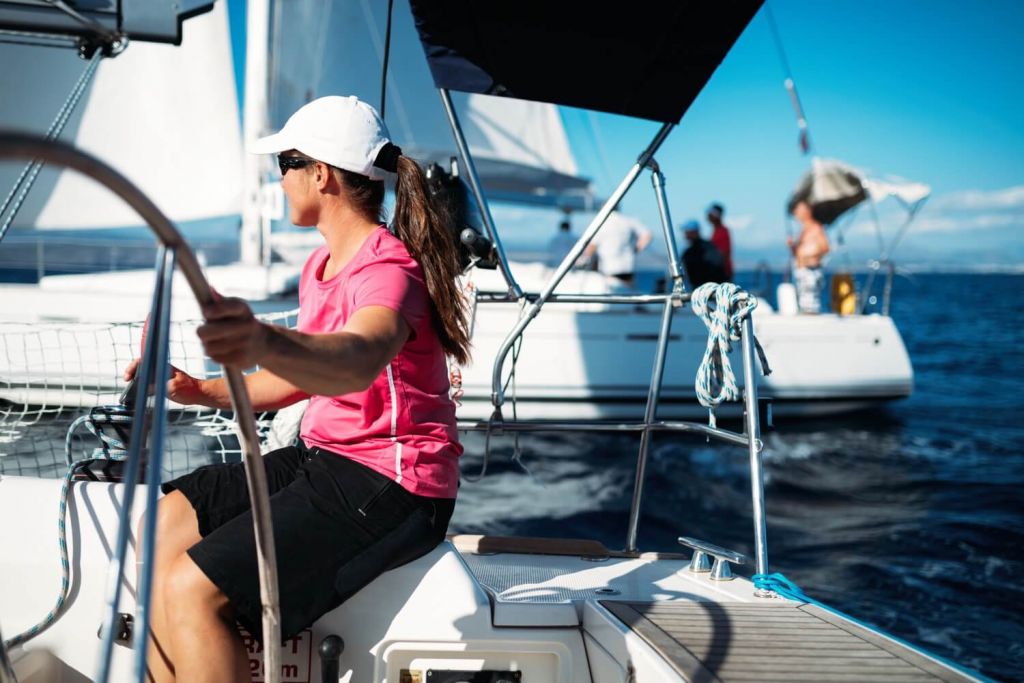
On this page:
Build your sailing experience, study related subjects, get qualified, make your cv stand out, nurture contacts in the industry, look for relevant jobs, assess your finances, stay on top of changes in the industry.
Whilst these are the most basic steps, there is a range of extra details related to each that you need to know about. Read on for a breakdown of each step, including insider secrets and best practice advice.
One of the most essential steps to becoming a yacht captain is to get experience. To be granted a captain’s license in the US, for instance, you need to have at least 360 days logged at sea. This is vital for ensuring that you have the experience necessary to be a captain - it’s not enough to walk onto a yacht and ask to be captain!
A day at sea is classed as 4 hours sailing non-stop and the 360 days must be completed within 5 years. It’s not enough to have logged 360 days cumulatively since you started sailing at the age of 7. You need to have had recent experience which can be proven with the relevant paperwork.
However, bear in mind that you don’t need to be directly working with the captain or operating as yacht captain for the hours at sea to count towards your experience. You can include hours working as a deckhand or even a maid on a cruise ship, so you have a bit more wiggle room. Bear in mind that for an entry-level role on many yachts, you just need to have a one-week safety course under your belt. This gives you a good route into gaining more experience, at very little personal cost. Make sure to check the requirements for the country where you will be getting your captain’s license as restrictions vary.
There are ways to learn to sail for (practically) free. Want to get started low key? Make sure to read our guide on how to get started sailing on the cheap .
On top of gaining plenty of experience at sea, it’s also essential that you hit the books. For starters, you will need to have at least a high school diploma. Ideally, you would also have a bachelor’s degree in a relevant subject such as Marine Engineering or Navigation and Maritime Science. If you can study at a specialized marine academy then that’s even better and could make it easier for you to get a job later down the line. Alternatively, look into taking classes at your local university or college.
As well as getting your formal qualifications, you might want to swot up on topics to do with navigational software, chart reading, ship safety and maritime mechanics, among other things. Doing your own study will help to give you a good start when it comes to gaining your captain’s qualifications and should make you feel more confident as you’re building up your sailing experience. You could also read maritime magazines to stay abreast of new changes in the industry, or alternatively look for trusted sources on the internet.
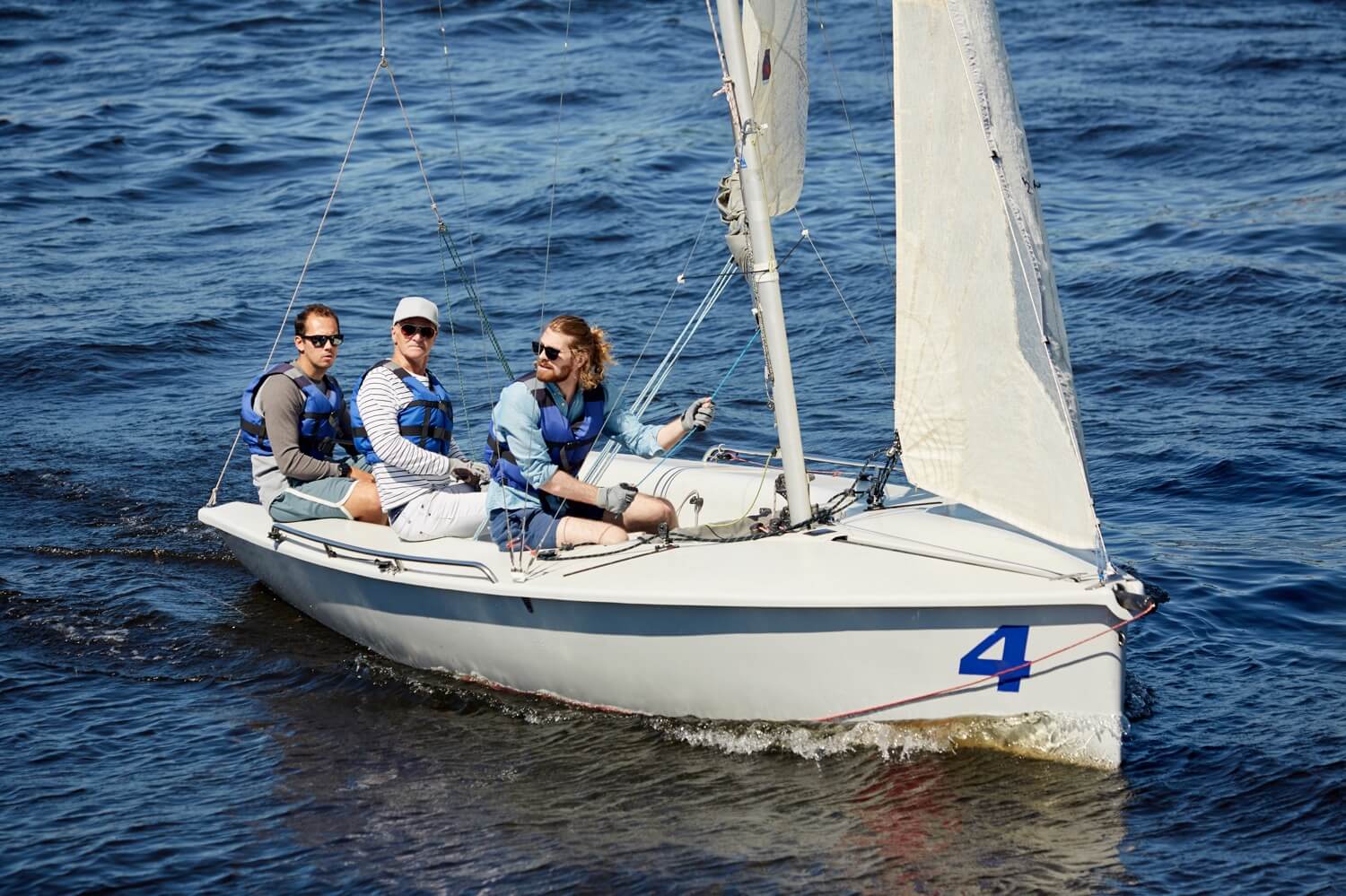
Once you have built up enough experience and ticked off all the entry criteria, you can apply for your captain’s license. Again, the process will vary according to the country where you are applying so make sure to double-check the details for your place of residence. You will also need to decide which level you are going for - usually divided between Inland, Coastal and Ocean qualifications, as well as the number of passengers and the size of the vessel.
To pass the requirements and be granted a captain’s license, you will need to make sure you have evidence of your experience at sea and evidence of any courses you have taken previously. To apply for a yacht captain’s license in the US, there are some extra criteria you will also need to fulfill including a physical exam, background check and three character references. Similarly, you will need to take a drug test and have a certificate for First Aid & CPR.
Find out how much a captain's license cost here (previous article).
If you want to become a yacht captain, you will also need to take another look at your CV - or make a new one! This is crucial in order to put your best foot forward when applying for jobs. Your CV should be tailored to the positions you’re applying to, which means highlighting transferrable skills, any relevant qualifications and your sailing experience so far.
The basics of good resume writing still apply so make sure that the document is formatted clearly and contains no grammar or spelling mistakes. Use formal language and put your most relevant experience first. All in all, your CV shouldn’t be more than two pages long. You want to be able to hand it over to the busiest captain and have them skim read it and decide immediately whether or not you’re right for the job. Few captains will take the time to read a lengthy, convoluted document.
Don’t forget, if you’ve done any roles that used similar skills like engineering, navigation, communication-heavy roles or working on board a ship of any kind, these can all help to boost your CV in your applications. Internships, Gap Year experience and volunteering all count, as long as they’re relevant. It can be helpful to include a professional-looking passport photo or headshot too.
One of the easiest ways to get immediate experience as a yacht captain and become one yourself is to make contacts in the industry. As with many roles, networking is key. If you have any existing acquaintances or friends in the industry, this is a great place to start. At the same time, you can approach captains for the first time and still make contacts who may be useful down the line.
The aim is to establish a connection with a captain that will lead to them recommending you for a job. If you’re going to be talking to yacht captains, try to make the effort to look professional. The individuals you talk to could be extremely busy, so you need to get your point across as quickly as possible and leave a good impression. That being said, you might catch someone on a good day in which case be friendly and stay and have a chat - this could be your first job interview.
How approachable captains are will really depend on the type of yacht you’re hoping to work on. Superyacht captains are likely to be far more stringent in their requirements and demand a higher level of professionalism than other captains, for instance. This is largely because the passengers on board will have different expectations from their captain and crew. This could also affect what it is like to work on that vessel so bear this factor in mind when you’re networking.
To secure a position as a yacht captain, you will probably need to demonstrate that you have at least 3+ years of professional experience. It is extremely rare that anyone will trust you with a yacht without experience above and beyond the requisite 360 days.
So how do you get experience? Ideally, you should try to find a role directly linked to the management or operations of a ship or yacht. Working in a hospitality position will not be enough to convince your future employer you are capable of being a captain. Instead, try to look for roles like third mate, second mate or deckhand and work your way up.
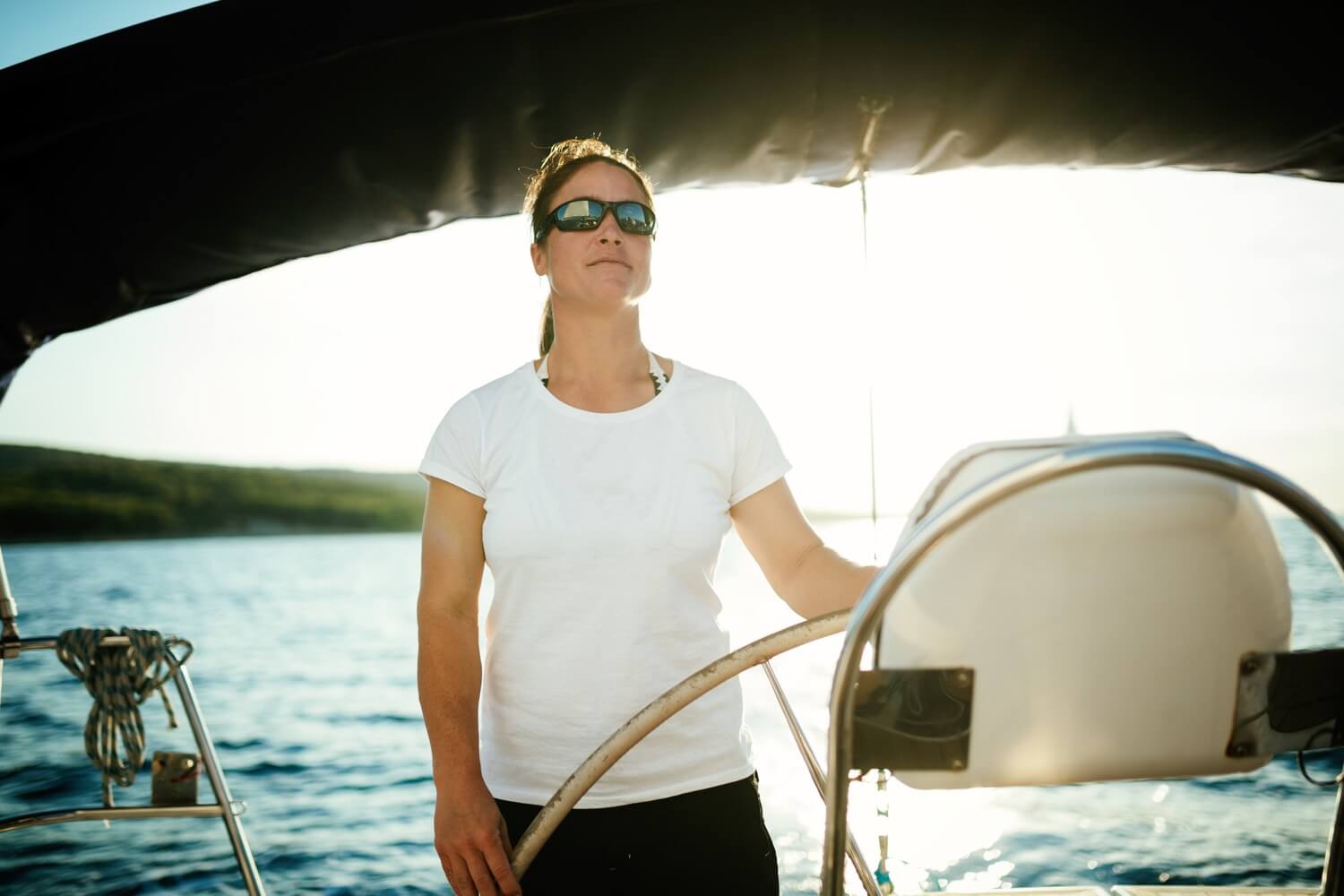
Some places to find jobs include:
- Online job sites
- Sailing and yachting forums
- Local ports and marinas - dockwalking, talking to crew and captains and enquiring about open positions
If you can’t find a position in which you can assist the captain, it’s enough to get an entry-level job and go from there. This is fairly common and you can gain valuable experience from being on board and observing others. There is nothing to stop you approaching the captain or first mate and explaining your end goal, asking to spend some time learning from them. Everyone has to start somewhere!
On your journey to becoming a yacht captain, you will also need to be strict about your finances. You will have to make sure that you have enough funds to cover a pre-test training course, exam fees and license processing fees. These costs vary considerably and can reach upwards of $2,500.
Similarly, if you’re struggling to secure a job and are traveling regularly to find new networking opportunities, there can be a lot of hidden costs that mount up. If you’re not careful, you could be out of pocket before you’ve even begun to apply for a license.
The easiest way to get around this is to try and get as much of your commercial experience as possible in a paid position, even if it is not your first choice. Bear in mind that simply by being a deckhand on a local ferry, you could gain valuable experience and days at sea. It may not be as glamorous as you initially imagined but it is one important step towards achieving your end goal.
It is crucial that you keep learning, even after you’ve achieved your qualifications and even secured a job. The best captains stay up to date with new developments in navigation and safe sailing and there’s always more to learn. Try to avoid getting complacent and keep doing your own study.
This is especially essential if you’re going to be working or traveling internationally as you are likely to encounter different and changing conditions. Whether it’s unpredictable waters or customs restrictions, yacht captains have to be aware and ready for every eventuality. As a captain, you will have people relying on you and that responsibility should not be taken lightly. Stay alert and stay curious, before and after you have your license.
If at first you don’t succeed try again.
This is true for achieving most things and becoming a yacht captain is no different. If you’re looking to become a commercial captain or work on a private yacht, it is unlikely you will be able to walk straight into a job. Similarly, there may be barriers to you passing your exams or getting your license.
In every eventuality, the important thing is not to give up. Often, new captains struggle because of lack of experience. If this is your problem, you can gain more experience by working on a yacht where you can work closely with the captain. You will learn a lot and if you’re willing to put in the work, you should be able to work your way up to being a captain. Enjoy the process, always keeping your end goal in mind.
Becoming a yacht captain takes commitment but the benefits can be huge. You will have the chance to have control of a yacht and spend your time sailing the seas, with the chance to see the world from one of the most beautiful vantage points. With these steps, you can start working towards becoming a yacht captain immediately. Good luck!
Leave a comment
You may also like, how much does it cost to get a captain's license.
So you've decided to make your sailing official! This article will tell you all about how much getting a captain's license will cost you.

Boat Navigation Lights Rules: Illustrated Beginners Guide

How To Get Your ICC Certification (in 8 Countries)
Own your first boat within a year on any budget.
A sailboat doesn't have to be expensive if you know what you're doing. If you want to learn how to make your sailing dream reality within a year, leave your email and I'll send you free updates . I don't like spam - I will only send helpful content.
Ready to Own Your First Boat?
Just tell us the best email address to send your tips to:
How to Become a Yacht Captain? Step-By-Step Guide
Setting sail on the high seas as a yacht captain is a dream that captivates the hearts of many. The allure of commanding a vessel, exploring breathtaking destinations, and living a life intertwined with the ocean’s vastness is undeniably enticing. However, this coveted role comes with great responsibility and requires a unique set of skills and qualifications.
In this article, we embark on a journey to unravel the path of becoming a yacht captain. We will delve into the responsibilities that come with this esteemed position and the skills needed to excel in the role. From mastering navigation and seamanship to leading a crew and ensuring the safety of all on board, the role of a yacht captain demands a comprehensive understanding of both the art and science of sailing.
While the journey to becoming a yacht captain may be challenging, it is a rewarding pursuit for those who possess a deep love for the sea and a desire for adventure. Whether you aspire to captain luxury superyachts or explore remote corners of the world on expedition vessels, this article will serve as a compass, guiding you through the necessary steps and providing insights into the world of yacht captains.
So, hoist the sails, secure the lines, and join us on this voyage as we explore the path to becoming a yacht captain and the exciting possibilities that await those who choose to navigate the oceans as masters of their own destiny.
Understand the Role of a Yacht Captain:
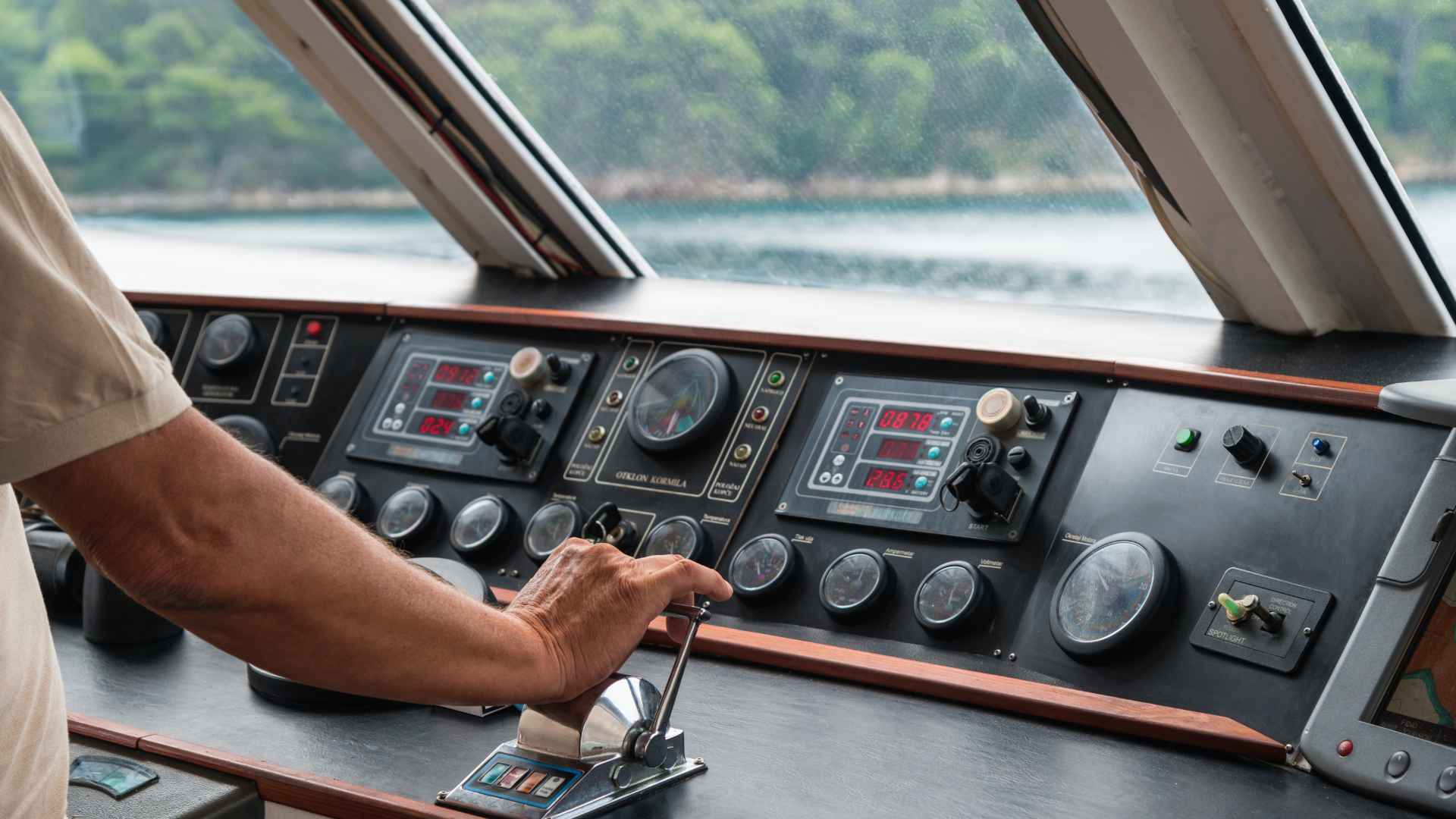
What are the primary responsibilities of a yacht captain?
The primary responsibilities of a yacht captain involve the overall operation and management of a yacht. Here are some key areas of responsibility:
- Vessel Navigation: The captain is responsible for safely navigating the yacht, ensuring it follows maritime regulations and adheres to navigation rules. This includes charting courses, monitoring weather conditions, and operating navigation equipment.
- Crew Management: The captain oversees the crew and is responsible for their training, supervision, and performance. They assign duties and delegate responsibilities to ensure smooth operations on board. Effective crew management involves fostering teamwork, promoting a positive work environment, and addressing any issues that may arise.
- Guest Safety: The safety of passengers and guests is a top priority for a yacht captain. They ensure that all safety protocols and procedures are in place and followed diligently. This includes conducting safety briefings, maintaining emergency equipment, and implementing appropriate security measures.
- Maintenance Oversight: The captain is responsible for the overall maintenance and upkeep of the yacht. They oversee routine maintenance tasks, coordinate repairs and inspections, and ensure that the vessel meets all safety and regulatory requirements. This includes managing budgets, inventory, and working closely with engineers and technical staff.
Effective Communication, Leadership, and Problem-Solving Skills:
Being a yacht captain requires strong communication, leadership, and problem-solving skills due to the nature of the role:
- Communication: The captain must effectively communicate with the crew, guests, and other stakeholders. Clear communication ensures smooth operations, fosters teamwork, and promotes safety on board.
- Leadership: A captain is expected to lead by example, inspire the crew, and make informed decisions in high-pressure situations. They must possess strong leadership skills to guide the team and manage various challenges that may arise.
- Problem-Solving: Yacht captains often face unexpected situations or emergencies. They need to think critically, make quick decisions, and find solutions to ensure the safety of everyone on board. Problem-solving skills are crucial for handling unforeseen circumstances effectively.
Necessary licenses and certifications required to become a yacht captain
To become a yacht captain, individuals must acquire the necessary licenses and certifications. The specific requirements may vary depending on the country and the type of vessel. Here is a general overview:
- OUPV (Operator of Uninspected Passenger Vessels) License: This license, also known as a six-pack license, is required for operating uninspected vessels carrying up to six paying passengers. It allows captains to operate charter boats, fishing boats, and small passenger vessels.
- Master License: The Master License allows captains to operate larger vessels that carry more passengers. There are different levels of Master licenses, such as Master 25, 50, 100, 200, and 500. The number denotes the maximum gross tonnage of the vessel.
Eligibility criteria for these licenses typically include:
Meeting the minimum age requirement (usually 18 years or older).
- Accumulating a specific number of sea service days, which may vary based on the license level.
- Passing a written examination that tests knowledge of navigation, safety, and other relevant topics.
- Meeting medical fitness requirements.
- Providing character references and completing an application process.
It’s important to note that these requirements can vary between countries and regions. It’s recommended to consult the maritime authority or governing body in the relevant jurisdiction to get accurate and up-to-date information on licensing and certification requirements for yacht captains.
Gain Experience and Build a Skill Set:
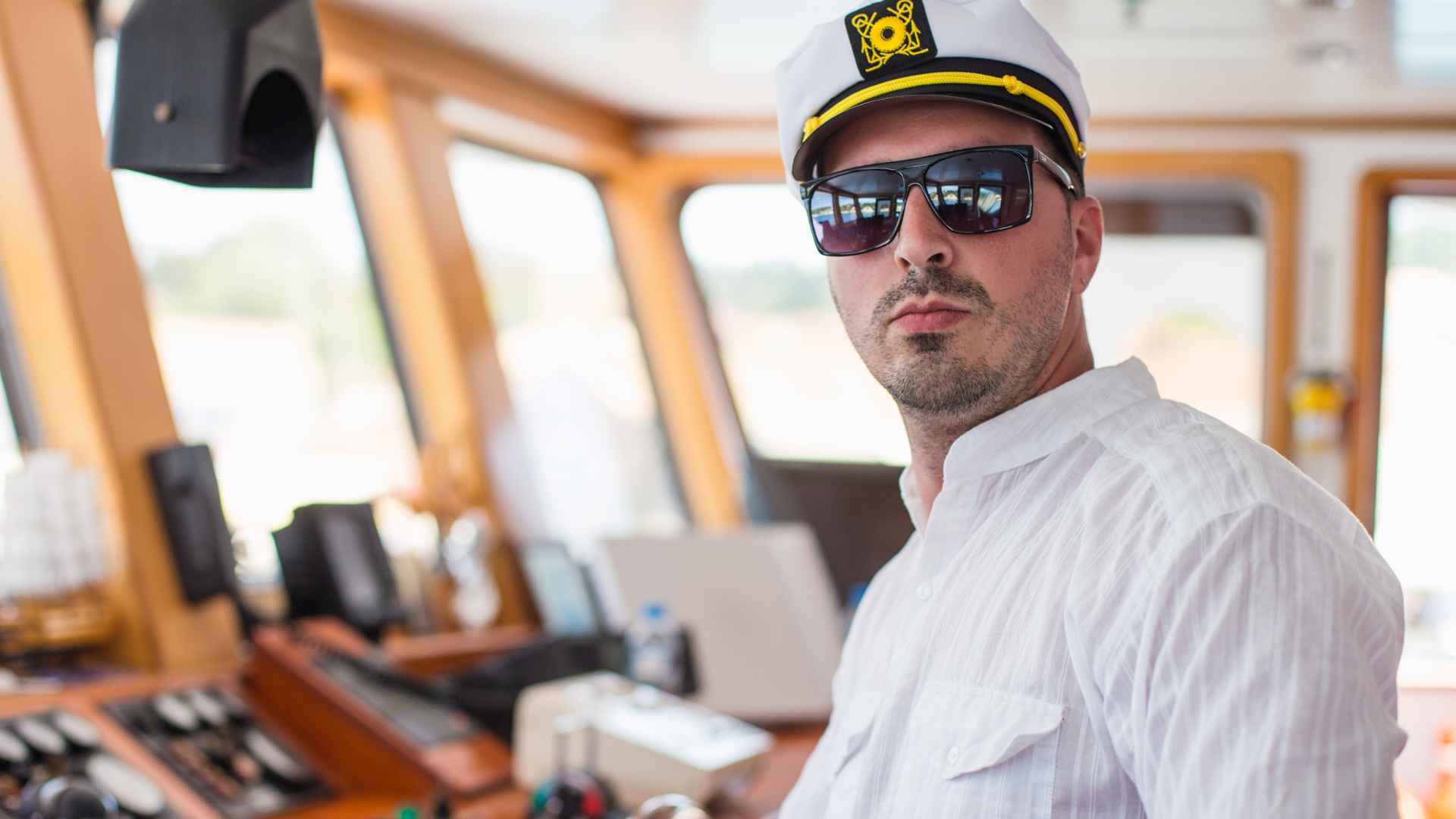
Importance of gaining foundational boating knowledge
Gaining foundational boating knowledge is essential for aspiring yacht captains. It provides a solid understanding of boating principles and sets the groundwork for further development. Here are some key points to consider:
- Understanding Navigation Rules: Familiarize yourself with the rules of navigation, including buoyage systems, right of way, and international maritime regulations. This knowledge ensures safe navigation and promotes responsible boating practices.
- Weather Patterns and Conditions: Learn about weather patterns, tides, and their impact on boating. Understanding weather forecasts and how to interpret them is crucial for planning safe voyages and avoiding hazardous conditions.
- Basic Boat Handling: Acquire basic boat handling skills, including steering, docking, and maneuvering in different environments. This knowledge forms the foundation for operating and controlling a vessel effectively.
There are various resources and courses available to help gain this knowledge. Consider taking boating safety courses offered by organizations such as the United States Power Squadrons (USPS), the U.S. Coast Guard Auxiliary, or local boating associations. Additionally, introductory sailing lessons or basic boating courses can provide valuable insights into navigation and boat handling.

Value of gaining hands-on experience by working as a deckhand or crew member on a yacht
Gaining hands-on experience by working as a deckhand or crew member on a yacht is invaluable for aspiring yacht captains. This experience provides insights into yacht operations, teamwork, and the daily responsibilities involved. Here are a few benefits:
- Exposure to Yacht Operations: Working on a yacht allows you to observe and participate in various tasks related to vessel maintenance, navigation, safety protocols, and guest services. You’ll gain practical knowledge and understand the dynamics of running a yacht.
- Teamwork and Communication Skills: Collaborating with other crew members fosters teamwork and effective communication. Learning to work efficiently as part of a team is crucial for a yacht captain, as they need to lead and coordinate the crew effectively.
- Networking Opportunities: Building connections within the yachting industry can lead to future job opportunities and career advancement. Engage with experienced professionals and seek mentorship to enhance your learning and growth.
Benefits of enrolling in professional training programs and maritime academies
Enrolling in professional training programs and maritime academies can significantly enhance your knowledge and credibility as a yacht captain. Here are a few options to consider:
- STCW (Standards of Training, Certification, and Watchkeeping) : The STCW training is an internationally recognized set of standards that provide essential safety and operational training for seafarers. This certification covers areas such as firefighting, personal survival techniques, first aid, and maritime security.
- RYA (Royal Yachting Association) Qualifications: The RYA offers a range of qualifications that are widely recognized in the yachting industry. These certifications cover areas such as navigation, radar operation, diesel engine maintenance, and yachtmaster training.
- Maritime Academies: Consider attending a maritime academy that offers specialized training for yacht captains. These institutions provide comprehensive education and practical experience, preparing you for various challenges of the role.
Investing in professional training demonstrates your commitment to the industry and enhances your skill set, making you a more competitive candidate for yacht captain positions.
Remember, gaining experience and building a skill set takes time and dedication. Embrace opportunities to learn, be proactive in seeking hands-on experience, and continually update your knowledge through courses and certifications.
Obtain the Required Licenses and Certifications:
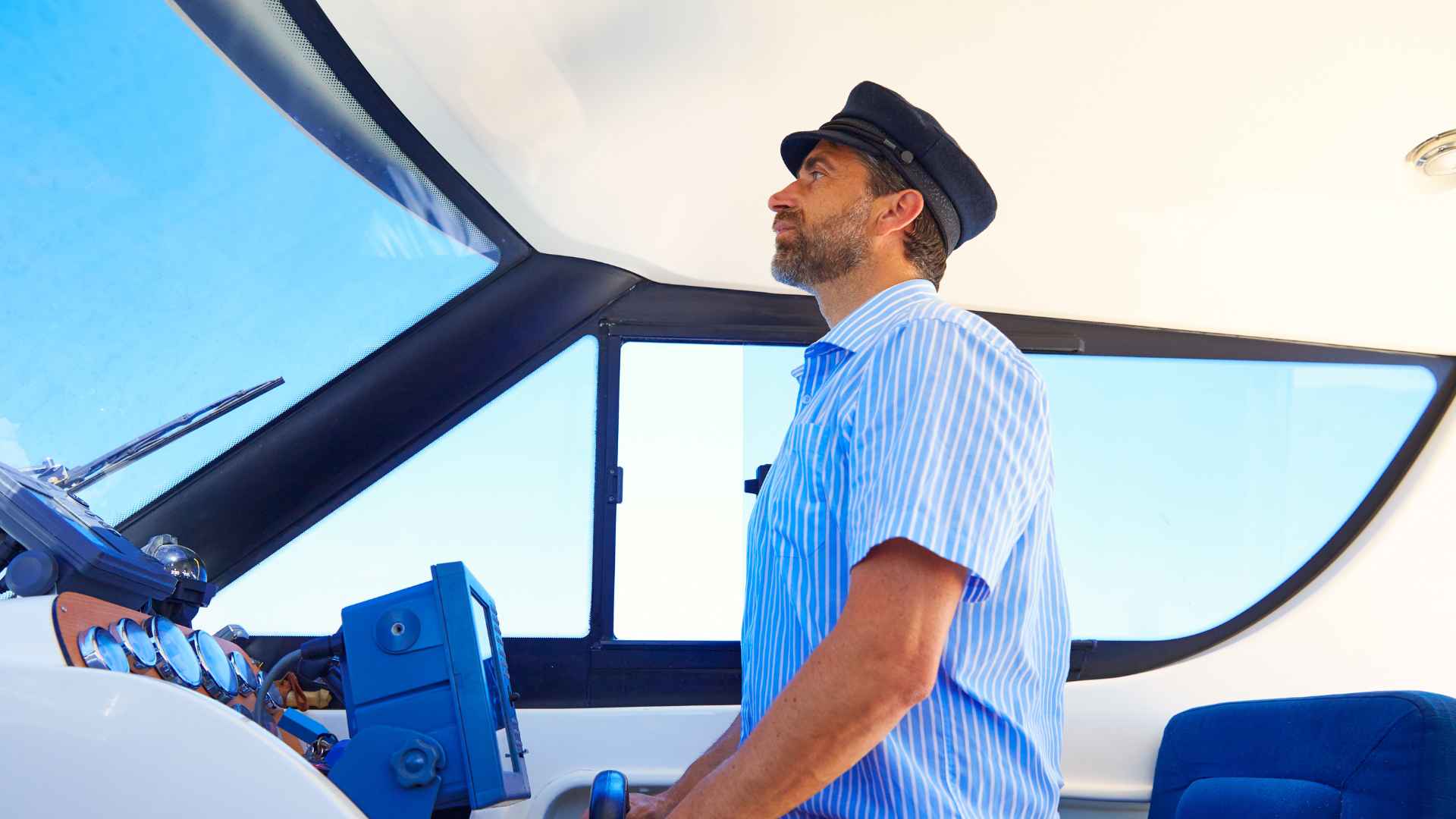
Familiarize yourself with licensing authorities:
To obtain the necessary licenses and certifications as a yacht captain, it’s important to familiarize yourself with the licensing authorities and organizations that oversee the process. The specific authorities may vary depending on the country or region. Here are a couple of examples:
- US Coast Guard: In the United States, the US Coast Guard is responsible for issuing licenses and certifications for yacht captains. They have different licensing levels, including OUPV (Operator of Uninspected Passenger Vessels) and Master licenses.
- Maritime and Coastguard Agency (MCA): The MCA is the licensing authority in the United Kingdom and is recognized internationally. They offer a range of certifications, including the Officer of the Watch (Yacht <3000 GT) and Master (Yachts) certificates.
Each licensing authority has specific requirements and application processes. It’s important to thoroughly research and understand the guidelines and regulations set forth by the respective authority in your jurisdiction.
Complete the required sea time and training:
Accruing the necessary sea time and training is a crucial step in obtaining your yacht captain licenses. The requirements may vary depending on the license level you are pursuing. Here are some key points to consider:
- Sea Time: Licensing authorities typically require a specific number of sea service days, which may include both qualifying sea service and additional time as an observer. The required sea time can vary depending on the license level and may involve different vessel sizes and types.
- Additional Training: In addition to sea time, you may need to complete additional training courses to meet the requirements. This can include training in radar operation, celestial navigation, firefighting, medical certifications like Basic First Aid or Medical Care, and other relevant topics. These courses enhance your skills and knowledge as a yacht captain.
It’s essential to maintain accurate records of your sea time and training, including the vessel names, dates, and duties performed. This documentation will be required during the application process.
Prepare for licensing examinations:
Licensing examinations assess your knowledge and competency as a yacht captain. Here are some tips to help you prepare:
- Study Relevant Regulations and Rules: Familiarize yourself with relevant regulations, such as navigation rules, safety procedures, and maritime laws specific to your jurisdiction. Study the applicable licensing guides or handbooks provided by the licensing authority.
- Navigation and Safety Procedures: Review navigation techniques, chart plotting, understanding aids to navigation, and collision regulations. Ensure you have a strong understanding of safety procedures, emergency protocols, and international maritime conventions.
- Preparatory Courses and Study Materials: Consider enrolling in preparatory courses offered by recognized training centers or maritime academies. These courses are designed to help you prepare for the licensing examinations and cover the necessary topics in depth. Additionally, study materials such as textbooks, online resources, and practice exams can aid your preparation.
Practice solving sample questions and scenarios to familiarize yourself with the format and structure of the licensing examinations.
Remember to check the specific requirements and recommendations from the licensing authority to ensure you are adequately prepared for the examinations.
By familiarizing yourself with the licensing authorities, completing the required sea time and training, and adequately preparing for the examinations, you can increase your chances of successfully obtaining the necessary licenses and certifications to become a yacht captain.
Advance Your Career as a Yacht Captain:
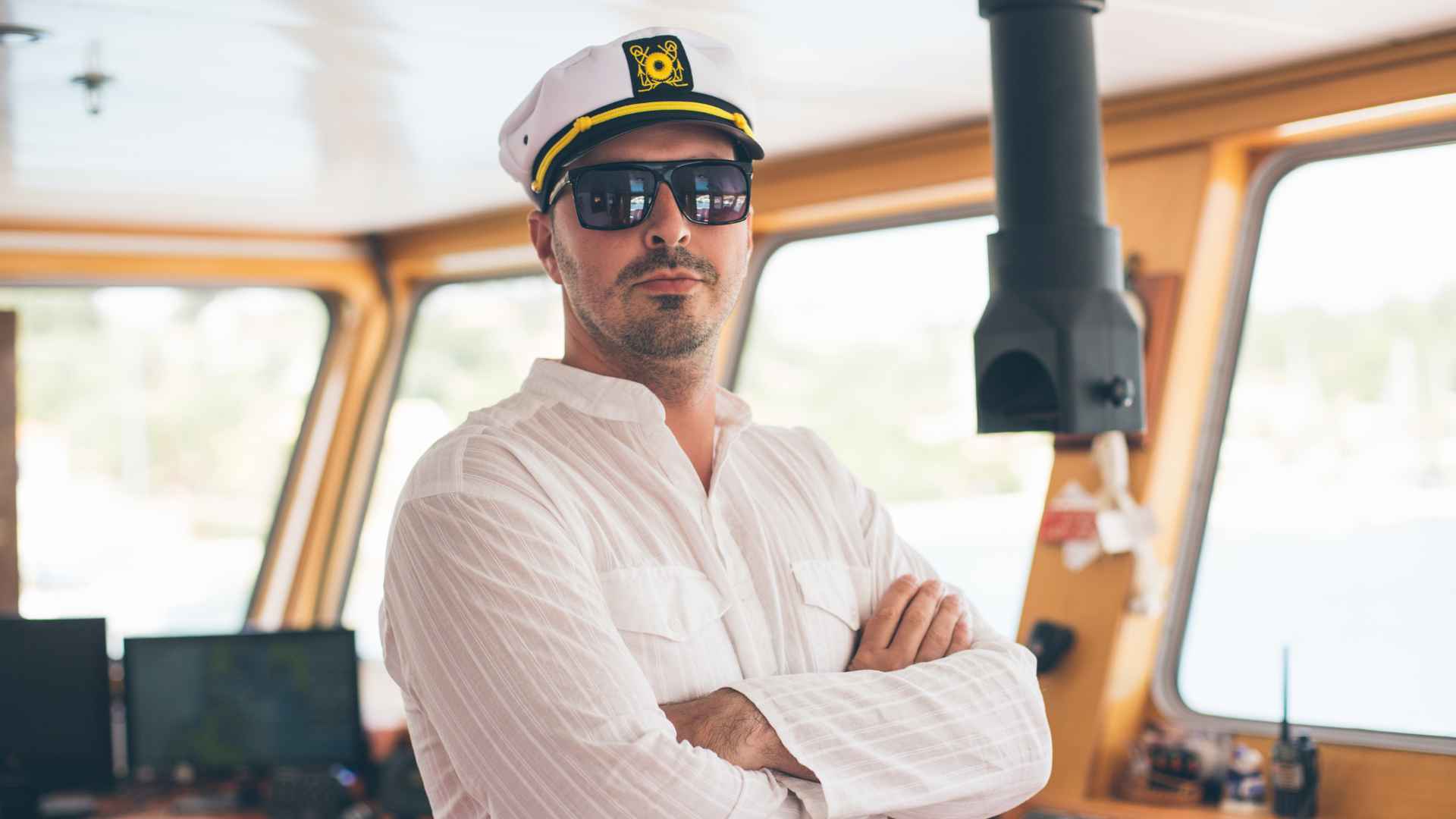
Network and establish connections:
Networking within the yachting industry is crucial for advancing your career as a yacht captain. Building relationships and establishing connections can lead to new opportunities and career growth. Here are some key points to consider:
- Industry Events: Attend industry events, such as yacht shows, maritime conferences, or trade fairs. These events bring together professionals from the yachting industry and provide opportunities to network, learn about new developments, and establish connections with yacht owners, brokers, and industry leaders.
- Professional Associations: Join professional associations and organizations related to yachting and maritime industries. These associations offer networking events, educational resources, and career support. Examples include the Professional Yachting Association (PYA), International Superyacht Society (ISS), or local yachting associations.
- Yacht Brokers and Crew Agencies: Build relationships with yacht brokers and crew agencies. Yacht brokers can connect you with potential employers and job opportunities, while crew agencies can assist with crew placement and career guidance. Stay in touch with them, provide updates on your experience and qualifications, and maintain a professional rapport.
Networking allows you to stay connected with industry professionals, increase your visibility, and access a broader range of opportunities.
Continue learning and professional development:
Continuous learning and professional development are essential for growth and advancement as a yacht captain. Here are some key aspects to consider:
- Stay Updated on Industry Advancements: The yachting industry is constantly evolving, with new technologies, regulations, and best practices emerging. Stay informed about industry trends, updates in safety protocols, navigation technologies, and regulatory changes. Read industry publications, follow reputable online sources, and attend relevant training sessions or workshops.
- Advanced Training and Specialized Certifications: Consider pursuing advanced training courses and specialized certifications to enhance your knowledge and skill set. These can include courses on advanced navigation techniques, superyacht operations, crisis management, leadership development, or specific technical skills like engine maintenance or electrical systems. These additional qualifications make you more competitive in the job market and broaden your career prospects.
- Professional Development Programs: Some organizations and institutions offer professional development programs tailored for yacht captains. These programs focus on leadership skills, management strategies, and industry-specific knowledge. Participating in such programs can enhance your leadership abilities, expand your network, and open doors to new opportunities.
Continuously investing in your learning and professional development demonstrates your commitment to excellence and positions you as a knowledgeable and competent yacht captain.
By networking within the industry, attending industry events, joining professional associations, and staying updated through continuous learning, you can advance your career, establish valuable connections, and position yourself for further growth as a yacht captain.
Watch What it takes to become a superyacht captain! | Video
Top 5 FAQs and answers related to How to Become a Yacht Captain
What qualifications do i need to become a yacht captain .
To become a yacht captain, you typically need to obtain the necessary licenses and certifications. The specific qualifications can vary depending on your location and the type of yacht you wish to captain. Common requirements include accumulating sea time, completing relevant training courses (such as navigation, safety, and emergency response), and passing licensing exams.
How do I gain the required sea time as a yacht captain?
Accruing the required sea time is an essential aspect of becoming a yacht captain. You can gain sea time by working as a deckhand or crew member on yachts, participating in internships or apprenticeships, or volunteering on boats. Keeping accurate records of your sea service days, duties performed, and the vessels you’ve worked on is crucial for meeting the licensing authority’s requirements.
Where can I find training courses for aspiring yacht captains?
There are various options for training courses related to becoming a yacht captain. You can find courses offered by maritime academies, vocational schools, yacht training centers, and professional organizations. Look for courses covering topics such as navigation, seamanship, safety procedures, and marine regulations. Additionally, licensing authorities often provide resources or recommendations for approved training providers.
How long does it take to become a yacht captain?
The time it takes to become a yacht captain can vary depending on individual circumstances, such as prior experience and the amount of time dedicated to training and gaining sea time. It can take several years to accumulate the required sea time, complete training courses, and pass licensing exams. The process also depends on your commitment to acquiring the necessary skills and qualifications.
Is it necessary to have sailing experience to become a yacht captain?
While sailing experience can be beneficial, it is not always a strict requirement to become a yacht captain. Many yacht captains start their careers with motor yachts or work on power-driven vessels. However, having sailing experience can provide you with a broader understanding of boat handling, wind patterns, and sail operations, which can be advantageous in certain yachting environments. It’s important to check the specific requirements and preferences of the licensing authority and potential employers in your desired field.
Conclusion:
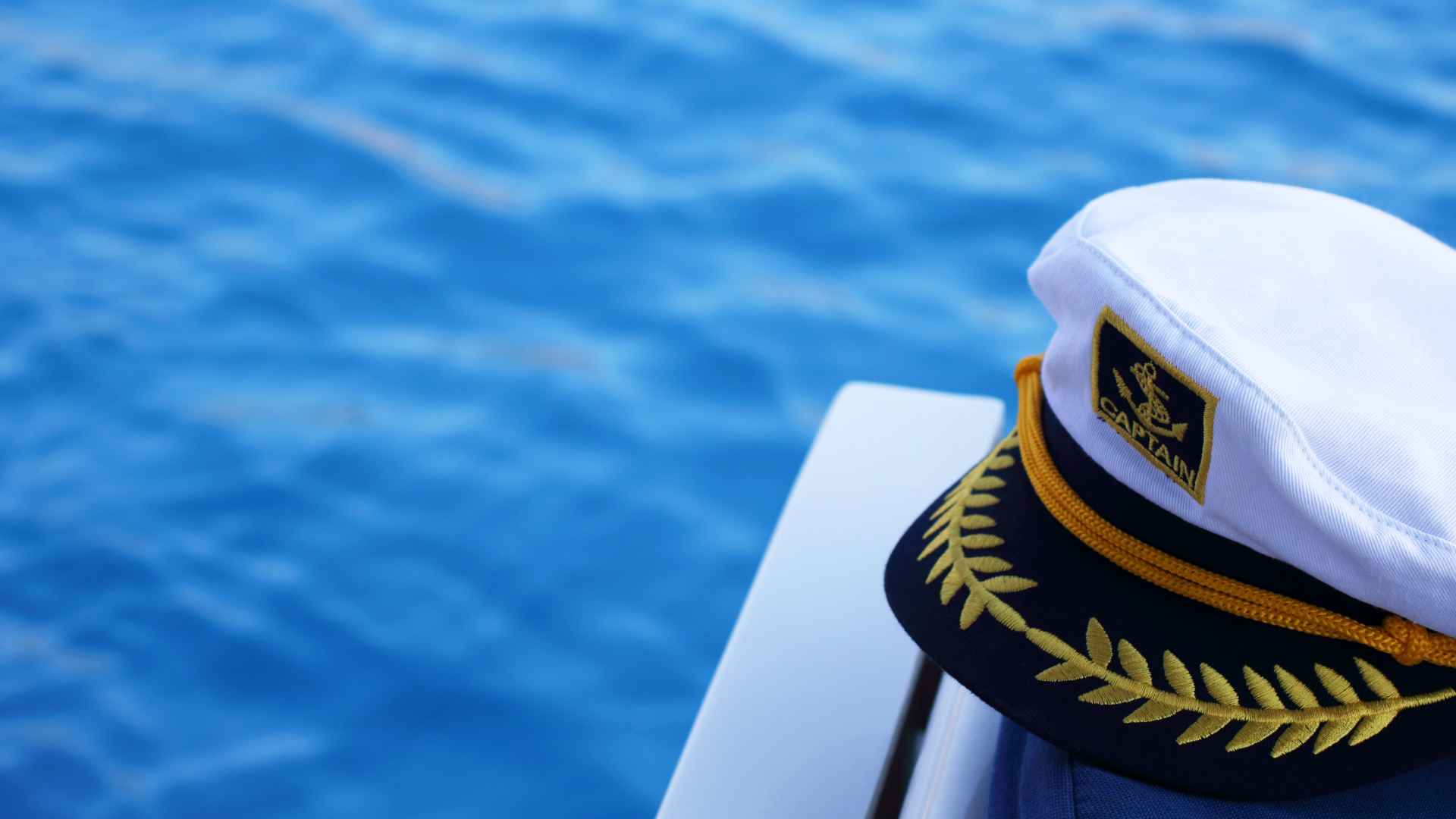
Becoming a yacht captain involves several key steps and considerations. Here’s a summary of the article’s main points:
- Gain Experience: Start by acquiring foundational boating knowledge, understanding navigation rules, weather patterns, and basic boat handling. Seek opportunities to work as a deckhand or crew member on a yacht to gain hands-on experience and learn about yacht operations and teamwork.
- Obtain Licenses and Certifications: Familiarize yourself with the licensing authorities relevant to your location, such as the US Coast Guard or Maritime and Coastguard Agency (MCA). Understand the specific requirements and application processes for obtaining the necessary licenses, which may involve sea time, training courses, and passing examinations.
- Focus on Professional Development: Continuously learn and stay updated on industry advancements. Consider advanced training, specialized certifications, and professional development programs to enhance your skills and knowledge as a yacht captain. This demonstrates your commitment to excellence and broadens your career prospects.
In conclusion, embarking on the journey to become a yacht captain requires dedication, practical experience, and a commitment to ongoing learning. By gaining experience, obtaining the required licenses, and focusing on professional development, you can position yourself for a rewarding career as a yacht captain. The open seas await, offering exciting adventures and the opportunity to lead a skilled crew while navigating luxurious yachts. Start your journey today and set sail towards an incredible future as a yacht captain.
Share How to Become a Yacht Captain? Step-By-Step Guide with your friends and Leave a comment below with your thoughts.
Read How to Build a Casting Deck in an Aluminum Boat in 6 Steps? until we meet in the next article.
Similar Posts
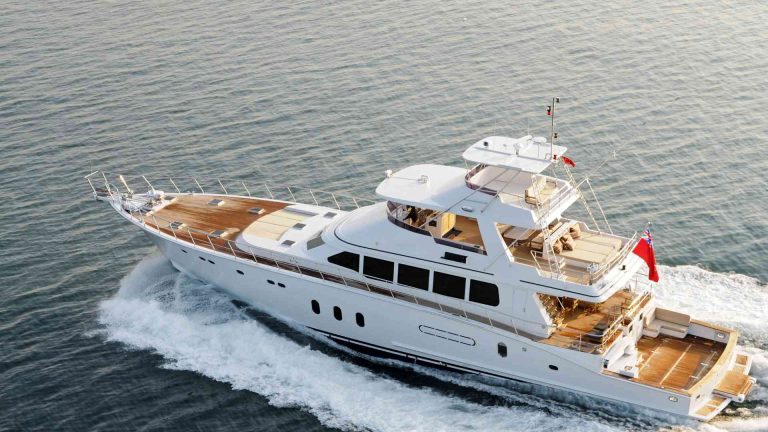
How Does Autopilot on a Yacht Work?
Navigating a yacht across vast, unpredictable waters requires precision, skill, and unwavering attention. Enter yacht autopilot, a technological marvel that has revolutionized the world of boating. It’s the invisible hand at the helm, offering sailors enhanced safety and convenience on their maritime journeys. In this article, we embark on a voyage into the world of…

How Far Can a Yacht Travel? Helpful Examples
Picture this: a majestic yacht glides gracefully through azure waters, the sun setting on the horizon, and the salty breeze carrying whispers of adventure. The yacht, a symbol of luxury and exploration, embarks on a journey that promises the thrill of the unknown and the allure of far-off destinations. Yachting, a symphony of elegance and…
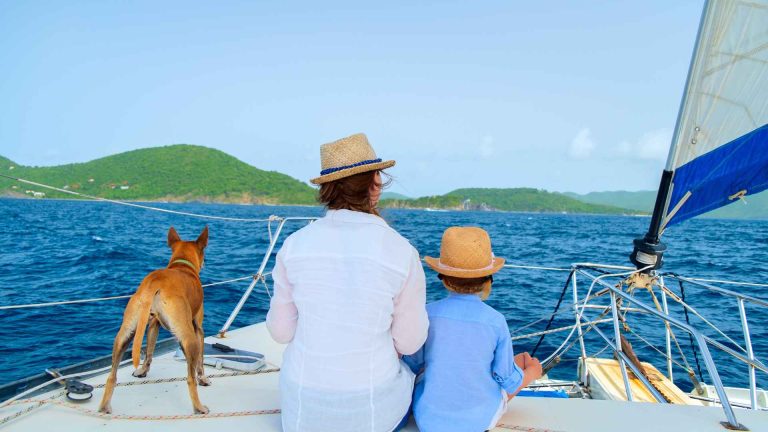
Can You Live on a Yacht? and if so, for How Long? – Guide
Living on a yacht evokes images of sun-kissed days, sparkling waters, and a carefree existence. The allure of a yacht lifestyle has captured the imagination of many, with its promises of adventure, luxury, and a break from the conventional. From the glamorous depictions in movies to the envy-inducing social media posts of jet-setters, it’s easy…

How to Become a Stewardess on Yachts in 5 Steps: Guide
Picture yourself amidst sparkling turquoise waters, basking in the warm rays of the sun, and indulging in the luxurious lifestyle of the high seas. Working as a stewardess on yachts offers a unique and enchanting opportunity to turn this dream into reality. From sailing across idyllic destinations to serving the needs of esteemed guests, this…
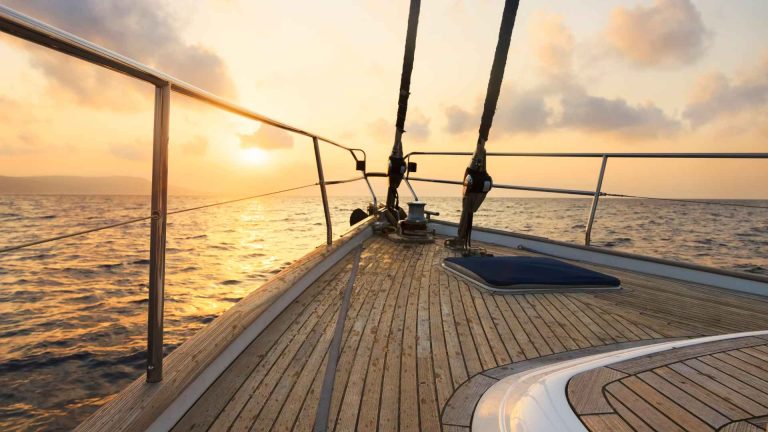
What Is the Best Country to Register a Yacht: Facts to Know
Owning a yacht brings a world of luxury, adventure, and boundless possibilities on the open seas. Whether you’re a passionate sailor or an avid explorer, yacht ownership is an exciting journey. However, amidst the thrill, it is crucial to navigate the legal and administrative aspects of yacht registration. Choosing the right country for yacht registration…

Can You Work on a Superyacht with Tattoos? Guide
Superyachts, the epitome of luxury and opulence, have long captivated the imaginations of those with a taste for the high life. These magnificent vessels, adorned with lavish interiors and offering unrivaled experiences on the open seas, have become a symbol of prestige and exclusivity. But as the allure of superyachts beckons, one question often arises:…
- PRO Courses Guides New Tech Help Pro Expert Videos About wikiHow Pro Upgrade Sign In
- EDIT Edit this Article
- EXPLORE Tech Help Pro About Us Random Article Quizzes Request a New Article Community Dashboard This Or That Game Popular Categories Arts and Entertainment Artwork Books Movies Computers and Electronics Computers Phone Skills Technology Hacks Health Men's Health Mental Health Women's Health Relationships Dating Love Relationship Issues Hobbies and Crafts Crafts Drawing Games Education & Communication Communication Skills Personal Development Studying Personal Care and Style Fashion Hair Care Personal Hygiene Youth Personal Care School Stuff Dating All Categories Arts and Entertainment Finance and Business Home and Garden Relationship Quizzes Cars & Other Vehicles Food and Entertaining Personal Care and Style Sports and Fitness Computers and Electronics Health Pets and Animals Travel Education & Communication Hobbies and Crafts Philosophy and Religion Work World Family Life Holidays and Traditions Relationships Youth
- Browse Articles
- Learn Something New
- Quizzes Hot
- This Or That Game New
- Train Your Brain
- Explore More
- Support wikiHow
- About wikiHow
- Log in / Sign up
- Occupations
- Transport Careers
How to Become a Boat Captain
Last Updated: July 28, 2022 References
Getting a Job
Expert q&a.
This article was co-authored by Nitzan Levy . Captain Nitzan Levy is a Sailor, Social Entrepreneur, and the Founder of Sailors NYC, a recreational sailors’ club based in Jersey City, New Jersey that specializes in cruising boats and a variety of community programs. Capt. Levy has over 20 years of sailing experience and has sailed in many places around the world including: the Atlantic Ocean, the Mediterranean Sea, The Caribbean, and the Indian Ocean. Capt. Levy is a U.S. Coast Guard Licensed Master of vessels up to 50 Tons with Auxiliary Sail and Assistance Towing Endorsements. Capt. Levy is also a NauticEd Level V Captain Rank Chief Instructor, an American National Standards Assessor, an SLC instructor, an ASA (American Sailing Association) Certified Instructor Bareboat Chartering, and an Israeli licensed skipper on Boats for International Voyages. There are 10 references cited in this article, which can be found at the bottom of the page. This article has been viewed 131,365 times.
Becoming a boat captain can be a time-consuming but rewarding process. A captain’s license isn’t necessary if you just want to take your own boat out for pleasure cruises, but it is required if you receive any compensation for your boat services. With the right education, experience, and test scores, you will be on your way to becoming a licensed boat captain.

- Learn communication skills through English classes and other language classes.
- Also consider taking computer classes and mechanical drawing classes.

- Get a degree in the field of marine transportation, marine engineering, maritime operations and technology, or shipyard management.

- Even if you can’t afford a full 4-year education, try to audit some maritime-related classes at your local university or community college.
- Look for classes offered by local organizations like the yacht club or sailing club.

- If you live near a coast, look for local businesses that specialize in these classes. If there's nothing near where you live, you can take an online course.
- These courses end in a written exam that can often stand in for the official exam. Check the Coast Guard website to find approved courses. [4] X Research source

- If this sea-time is spent under another captain's command, you will need to have this captain sign your license application when the time comes.
- Any time spent on a boat counts. So include hours working in positions such as a maid or deckhand on a cruise ship.

- Some positions to aim for are deckhand, third mate, second mate, chief mate, or engineer.
- Look for positions like tour guide, dockhand, sanitation officer, or boat mechanic.

- If it's not necessary, simply provide a statement with your application that says you don't need it.
- If a TWIC card is necessary for you, you can apply for it through the TSA.

- The Master license involves far more sea-time hours, but there’s no need to get the six-pack license first. Jump right to the Master if that’s the one you want.

- Additional identification will be required, such as a social security card or an I-551 alien registration card.

- You can submit your application and any supporting documents in person at a local Regional Exam Center (REC) or send it to the REC through the mail.
- If you're outside the U.S., you'll need to apply for the International Certificate of Competence (ICC) through the Royal Yacht Academy.

- References from licensed captains, commercial fishermen, or others who own and operate their own boats are generally best.
- These character reference letters should also be notarized.

- This exam will usually consist of multiple choice questions about deck and safety procedures, general navigation, and rules associated with operating a boat in shared waters. [17] X Research source

- If your application is approved, your license and credentials will be printed and mailed to you.

- Join your local yacht club or sailing club to make more contacts there.
- Go mingle with other captains at local docks and start up conversations with them. They may know of more job openings.

You Might Also Like

- ↑ https://bigfuture.collegeboard.org/careers/transportation-ship-captains-marine-pilots
- ↑ http://education-portal.com/become_a_ship_captain.html
- ↑ http://study.com/become_a_ship_captain.html
- ↑ http://www.dco.uscg.mil/Portals/9/NMC/pdfs/faq/exams_faqs.pdf?ver=2017-07-13-110959-517
- ↑ http://matadornetwork.com/notebook/how-to-become-a-boat-captain/
- ↑ http://www.payscale.com/research/US/Job=Ship_Captain/Salary
- ↑ Nitzan Levy. Sailing Instructor. Expert Interview. 24 April 2020.
- ↑ http://www.dco.uscg.mil/Portals/9/NMC/pdfs/faq/twic_faq.pdf?ver=2017-05-31-144812-903
- ↑ https://asa.com/news/2013/08/12/uscg-captains-license/#
- ↑ http://www.dco.uscg.mil/Our-Organization/Assistant-Commandant-for-Prevention-Policy-CG-5P/National-Maritime-Center-NMC/merchant_mariner_credential/
About This Article

If you want to become a boat captain, obtain your high school diploma or GED. After school, enroll in a captain’s license class or a college program where you’ll learn about navigation, tidal calculations, international and inland boating rules, and meteorology. Before you can obtain a captain’s license, you must have a minimum of 360 days worth of sea time within a 5-year period, where a “day” is 4 consecutive hours on the water. This can be piloting the boat or working as a deckhand on a cruise ship. For more information on getting your license, read on! Did this summary help you? Yes No
- Send fan mail to authors
Reader Success Stories
Aug 30, 2016
Did this article help you?
John Williams
Dec 7, 2021

Featured Articles

Trending Articles

Watch Articles

- Terms of Use
- Privacy Policy
- Do Not Sell or Share My Info
- Not Selling Info
Don’t miss out! Sign up for
wikiHow’s newsletter
- Get Started
- OUPV/Six-Pack Captain’s License
- 25/50 or 100-Ton Master Captain’s License
- License Endorsements
- All USCG Captain's License Courses
- FCC MROP – Marine Radio Operator Permit
- FCC Exam Package Deals
- FCC Individual Exams
- FCC Practice Test Books
- Captain's License Guides
- FCC License Guides
- Why Our Students Succeed
- MLS Learning Tools
- Online Testing
- American Hero Fund (ID.me)
- Licensing Guides
- How To Videos
- Help Center
- 24/7 Live Technical Support
- Mariners Life
- Mariners Gear
Add description, images, menus and links to your mega menu
A column with no settings can be used as a spacer
Link to your collections, sales and even external links
Add up to five columns
How To Become a USCG Licensed Ship Captain: A Guide
February 15, 2024
So You Want To Become a Ship Captain: The Definitive Guide
Common Questions About Becoming a Ship Captain
1. Why Get a USCG Captain’s License?
If you are thinking of becoming a licensed ship captain, you are not alone. It's a dream shared by many people for a variety of reasons, both personal and financial. For some, it's the idea of offering fishing and sailing charters, running a dive boat, or becoming a certified instructor. For others, it is the skill and mastery they achieve by earning their license. Ultimately, many boaters enjoy the respect, admiration, and personal satisfaction that come from being a licensed boat captain.
2. How Do You Become a Ship Captain?
Thousands of people apply each year to get their certification for the Coast Guard's National Maritime Center. The fact that so many people have taken steps to earn their license speaks volumes about the allure of being recognized as a USCG licensed boat captain. If the idea of becoming a captain appeals to you, be assured it is a goal you can achieve with a reasonable amount of effort and focused study.
But how exactly does one achieve this goal, and what do people do with their captain's license, and what opportunities are there once you're certified?
Download our free Definitive Guide to Becoming a Licensed Captain now and learn how to turn your dream into a reality.
3. How Long Does It Take To Get Your Captain’s License?
How long it takes to get your USCG captain’s license varies based on the time it takes you to complete a course and your application. If you do not have enough days of documented boating experience for your desired license, you will need additional time.
Once you have the required amount of boating experience, it’s just a matter of taking a course that prepares you for the captain’s license test, gathering the required materials, and completing a physical and drug test. The process may take anywhere from a few months to a year. You have up to one year to submit your application after taking your test.
Ready to Get Started?
Shop Courses or Talk to a Licensing Specialist
Be a superyacht Captain
So you want to become a superyacht captain.
The Captain of any yacht has one primary duty; the safe manning and operation of the yacht. This includes taking full responsibility for the crew, tenders, toy and all the guests onboard.
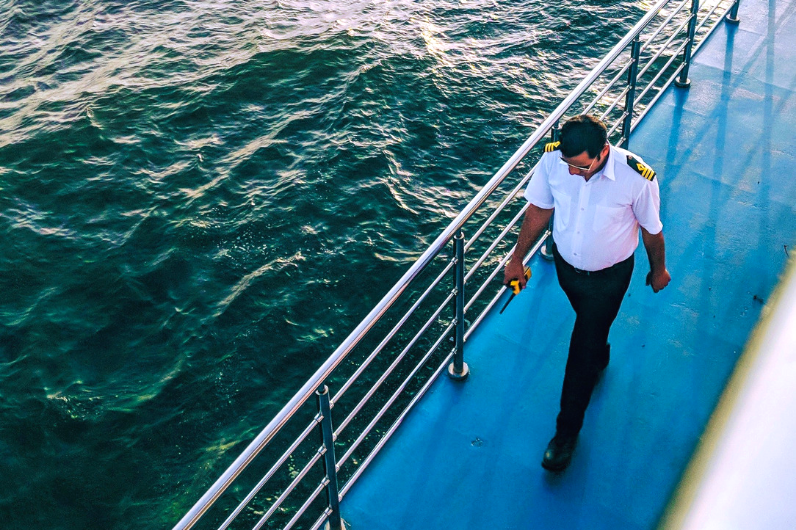
Job Role of a Superyacht Captain
As a rule, the smaller the yacht, the more hands-on the Captain must be. The larger the yacht, the more administrative duties the Captain will hold. A superyacht Captain specialises in commanding and managing luxury yachts over 24 metres in length.
Every crew member falls under the ultimate command of the Captain and will answer to him/her.
What does a Superyacht Captain do?
As a superyacht Captain, you’ll be at the top of your game, responsible not only for the yacht itself, but also for its crew, itinerary and navigating safe passages across the oceans. You’ll be in control of budgeting, administration, refit projects, yard visits, personnel, health and safety, to name but a few.
Personality traits
What personal traits are beneficial for this role.
You will need great communication skills to deal with owners, contractors, crew and guests alike. You will be dedicated to a career at sea and will already have established yourself in the industry having worked your way up the deck officer ladder building a reputation as a first-class professional along the way.
As a Captain, you must be highly skilled at dealing with people, both crew and the owner/guests. Personnel management skills are critical within this role.
Skills required to be a Superyacht Captain
What skills or experience are required.
Captains must have considerable maritime experience and training. A Captain of a superyacht has to have excellent seafaring knowledge, a good grasp of accounting, IT and administration and also deal with authorities on matters such as paperwork and health and safety.
Previous experience of yacht handling is essential and handling a yacht of the same or similar sizes a distinct advantage.
Benefits of being a Superyacht Captain
Your role really will be all-encompassing and you’ll answer to the yacht’s owner about all the decisions you make. A career as a superyacht Captain is demanding but rewarding. You’ll enjoy worldwide travel and earn a fantastic salary of anything from €4,000 per month with no cap on salary!
How to start your pathway to become captain?
More than just a love of the sea and a captain’s hat are needed to start a career as a superyacht captain. This is a career path that requires commitment, training, and practical experience. Enrolling in classes that offer the required maritime qualifications is the initial step. Take the Superyacht Cadetship Course as your first step into this fascinating industry. This extensive programme gets you ready for the rigours of the open sea by fusing classroom instruction with real-world sea experience. It is essential to network within the industry, and UKSA offers a helpful community that helps you take advantage of opportunities and pick the brains of industry experts. And never forget that your love of the sea serves as your compass; follow it to become a captain.
Career prospects
Be inspired graduates return to uksa to hire crew and further their training.
“We trust in UKSA because we did our training there and can vouch for its quality. Because the courses are all-inclusive they run back-to-back which really helps with fitting around our schedules. It is the best place from which to hire successful crew because the career courses are similar to a university degree. UKSA students devote time to their training and so are looking to stay with a boat for at least two seasons. This is valuable to us as we take time to invest in our crew and training – with UKSA we also know what to expect.” Officer Daniel Lambert
- MY Icon – 6 generations of UKSA trained crew now all working together
- Dan Snook – Planning to come back to UKSA for his Master 3000gt modules
Register your interest
- First name *
- Last name *
- How did you hear about UKSA? * –None– Campaign Dinghy Show Educational Visits UK Event GroupAccommodation.com Guardian Media IOW College IOW County Press London Boat Show Online PlanMySchoolTrip.co.uk Press Radio Referral School Travel Organiser Social Media Southampton Boat Show Top School Trips UKSchoolTrips.co.uk Visit IOW Yachts & Yachting
- General notes
- Opt-in to receive course information and relevant offers
- Accept Privacy Policy and Terms and Conditions .
- Email This field is for validation purposes and should be left unchanged.
If you have any questions or need to get in touch:
Speak to UKSA on +44 (0)1983 294941 or email us
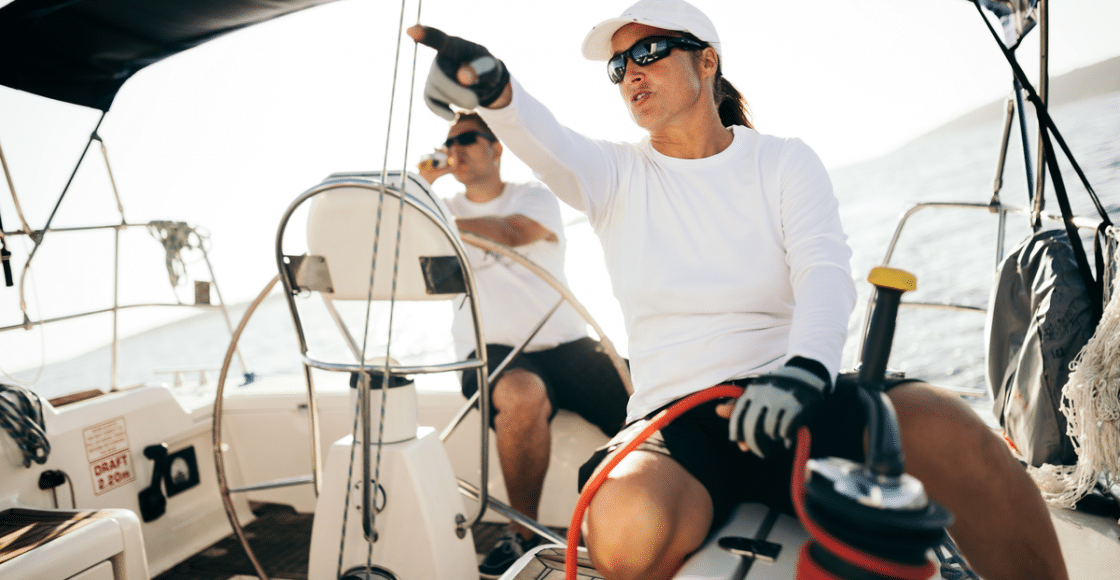
How becoming a charter boat captain is easier than ever

Are you an experienced boater who enjoys taking friends and family out on the lake, river, or bay? Did you grow up on the water? Do you see nautical charts in your sleep and make float plans for the fun of it? If so, becoming a yacht charter captain may be just the profession for you.
Charter Boat Captains
Charter boat experiences such as fishing, sightseeing, and water sports are always popular options in resort and vacation destinations . With today’s boat sharing economy which has allowed boaters to rent a boat from a private owner, the title of boat captain has become an even more viable career option. Often, the renter may not be an experienced boater and needs to hire a licensed and knowledgeable captain .
This is where your skills come into play. Though it depends upon experience level, demand, and geographic area, a charter boat captain can make a great income doing what he or she loves – being out on the water.
A charter boat captain’s license is issued by the United States Coast Guard and is based upon the following criteria:
- Total days of service
- Waters served upon
- Weight of the vessel
There are four main categories of charter boat captain license:
- Operator of Uninspected Passenger Vehicles License (OUPV) – One of the most popular types of boat captain license, this is also called a 6-Pack License. The vessel is less than 65 feet and there are no more than six passengers. This license usually applies to fishing, diving and sightseeing boats. To obtain this license, the boater must have 360 days of experience on inland or coastal waterways.
- OUPV Limited Credential – Also called a “launchtender’s license,” this license has a very specific purpose. It is used for the operation of uninspected vessels for a short time. This could include transporting boaters to and from a dock to a bigger boat that is moored out in the water. The captain must have 90 days of service on that type of vessel and complete a United States Coast Guard (USCG)-approved Safe Boating Course.
- Limited Master Credential – In addition to the OUPV requirements, this option is licensed for boats that have passed US Coast Guard inspection and have an inspection sticker. This license requires 120 days of service on the type of vessel that will be operated as well as a completed USCG-approved Safe Boating Course. The license can be extended to include sailing vessels if the captain completes 120 days of service on a sail-powered vessel.
- Master, 100 Tons Credential – Vessels up to 100 tons can be operated with this license, and there can be as many passengers on board as the vessel will hold. The captain must have at least 360 days of service on any vessel. A separate exam can be taken to qualify for a tow boat assistance license.
Job opportunities for charter boat captains include:
- Join a boat sharing company, such as Boatsetter , and captain fishing charters and sightseeing tours
- Embark on snorkeling and diving trips and sunset and dinner cruises
- Assist in towing with companies such as Sea Tow or Tow Boat U.S.
- Operate water ferry service for transportation, recreation and entertainment
Hey Captains, what tips would you give to someone considering a new career? Share some insider tips…
Ready to join the Boatsetter captain network? Sign up today and start earning on your schedule!

Boatsetter empowers people to explore with confidence by showing them a world of possibility on the water. Rent a boat, list your boat, or become a Boatsetter captain today.
Browse by experience

Explore articles

Buying a Boat? Here's Our Advice
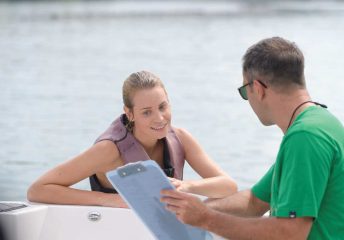
What Information Should Be Included on a Float Plan?

11 Best Restaurants on the Water in Austin, Texas
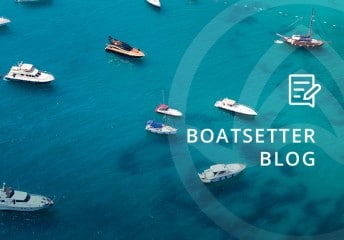
Boat insurance basics for owners thinking about boat sharing

How To Become A Superyacht Captain? (Step by Step Guide)

Have you ever dreamed of becoming a superyacht captain and sailing the world’s oceans? It’s a unique opportunity to explore the world and live an exciting and luxurious life.
But how do you become a superyacht captain? In this step-by-step guide, we’ll cover the qualifications and requirements for becoming a superyacht captain, as well as what superyacht captains do on a day to day basis.
We’ll also look at the Merchant Marine Officer License, experience and knowledge requirements, and technical certifications needed to become a superyacht captain.
Finally, we’ll discuss how to apply to become a superyacht captain.
So if you’re ready to embark on an exhilarating journey and discover the secrets to becoming a superyacht captain, read on!
Table of Contents
Short Answer
To become a superyacht captain, you must first obtain a valid captain’s license from the U.S.
Coast Guard.
This requires a certain amount of experience and training, and often a course of study that can take several months or even years.
Once the proper licensure has been obtained, you can then apply for positions with superyacht companies.
This may involve further training and experience, depending on the company.
Additionally, most companies require a background check and drug screening, as well as other necessary documents.
Qualifications and Requirements for Becoming a Superyacht Captain
Becoming a superyacht captain is a highly sought-after and rewarding career path.
It requires a combination of technical knowledge, experience on the water, and a deep understanding of the industry.
To become a captain, you must possess a variety of qualifications and meet specific requirements.
First, you must have a Merchant Marine Officer License, which requires passing exams and training courses.
This license will provide you with the authority to operate the vessel, manage crew, and maintain legal compliance.
Next, you must have a minimum of five years of experience as a deckhand or mate on a commercial vessel.
This ensures you have the necessary skills and knowledge to safely navigate and operate a superyacht.
In addition, it is important to have a strong knowledge of the local and international laws related to maritime navigation, safety, and ship operations.
Having a certification in first aid, firefighting, and boat maintenance is also beneficial.
With the right qualifications and experience, you can become a successful superyacht captain.
Finally, it is important to have the right attitude and personality to be a great captain.
Superyacht captains must be confident, organized, and have excellent communication and problem-solving skills.
It is also important to be able to remain calm under pressure and have the ability to motivate and lead a crew.
These are just some of the qualifications and requirements necessary to become a superyacht captain.
With the right qualifications and experience, you can become a successful captain and embark on an exciting and rewarding career.
What Do Superyacht Captains Do?

Superyacht Captains are responsible for the safe operation and navigation of large, luxury vessels, also known as superyachts.
They are responsible for the safety of the crew and passengers, as well as the vessel itself.
They must be familiar with all the technical aspects of operating a yacht, such as navigation, engine maintenance and repair, electrical and electronic systems, and basic boat handling.
They must also be well-versed in the laws and regulations governing maritime operations, and take all necessary precautions to ensure the safety of the crew and passengers.
Superyacht Captains must be highly knowledgeable about the local and international waters they navigate, and are responsible for ensuring the vessel complies with all applicable laws and regulations.
In addition to their technical knowledge, Superyacht Captains must also possess strong leadership and interpersonal skills.
They are responsible for leading the crew, and must be able to effectively communicate and delegate tasks to ensure the successful operation of the vessel.
They must be able to make quick decisions in emergency situations and be able to stay calm and focused under pressure.
The responsibilities of a Superyacht Captain also extend to the vessels maintenance and upkeep.
They are responsible for ensuring the vessel is properly serviced and maintained, and must be able to detect and repair any defects or issues that may arise.
They must also be able to effectively manage the vessels budget and resources.
Overall, Superyacht Captains must be highly skilled and knowledgeable in all aspects of operating and maintaining a large vessel.
With the right qualifications and experience, they can become successful Superyacht Captains.
The Merchant Marine Officer License
The Merchant Marine Officer License is one of the most important requirements for becoming a superyacht captain.
This license is issued by the United States Coast Guard (USCG) and certifies that the holder has the skills, knowledge, and experience to safely operate and maintain a vessel.
In order to obtain this license, the aspiring captain must pass a series of exams and complete training courses.
These courses can range from basic navigation and seamanship to more specialized topics such as maritime law, emergency response, and environmental safety.
Additionally, applicants must have at least five years of experience as a deckhand or mate on a commercial vessel.
The exams and courses that must be taken for the Merchant Marine Officer License are designed to test a captain’s knowledge of maritime law, navigation, and safety protocols.
They also help to ensure that the captain has the necessary skills to safely and effectively manage a vessel.
To become an experienced captain, these exams and courses must be taken and passed with a satisfactory score.
Finally, obtaining a certification in first aid, firefighting, and boat maintenance is also important for becoming a superyacht captain.
This certification is not required by the USCG, but it demonstrates an individual’s commitment to safety and their understanding of the best practices in the industry.
Having this certification can help the prospective captain stand out from other applicants and demonstrate their knowledge and expertise.
Experience Requirements

Becoming a superyacht captain requires a combination of significant technical knowledge, experience on the water, and a deep understanding of the industry.
It is essential for any applicant to have a minimum of five years of experience as a deckhand or mate on a commercial vessel.
This experience can be acquired by working on a variety of vessels in different roles such as deckhand, mate, engineer, or navigator.
It is not only important to have the experience but also to learn from it.
This will help develop a strong understanding of the maritime industry and the technical and operational skills needed to become a successful captain.
This is because a captain must be prepared for any emergency situation that may arise onboard.
Additionally, having knowledge of the local and international laws related to maritime navigation, safety, and ship operations is essential.
This will help ensure that the captain is able to navigate, maintain, and operate the vessel according to the regulations.
Finally, it is important to have a Merchant Marine Officer License.
This license is acquired by passing exams and completing the required training courses.
The exams are designed to assess the candidates knowledge of the maritime industry and the regulations.
The training courses include navigation, seamanship, and safety.
Once the license is obtained, the candidate is officially certified to become a captain.
By meeting the experience and qualification requirements, any applicant can become a successful superyacht captain.
With the right dedication and effort, the dream of becoming a captain can become a reality.
Knowledge Requirements
Aspiring captains must possess a combination of technical knowledge, experience on the water, and a deep understanding of the industry.
The most important knowledge requirement for a superyacht captain is a Merchant Marine Officer License.
This is a professional certification that requires passing exams and attending specialized training courses.
Captains must also have a minimum of five years of experience as a deckhand or mate on a commercial vessel.
To be a successful captain, it is important to have a strong knowledge of the local and international laws related to maritime navigation, safety, and ship operations.
Additionally, a certification in first aid, firefighting, and boat maintenance is beneficial.
In addition to the technical knowledge, a superyacht captain must have a comprehensive understanding of the industry.
This includes navigation tactics and techniques, safety protocols, local customs and regulations, and emergency procedures.
A well-rounded knowledge of the industry can help captains make informed decisions and provide a safe and comfortable environment for their crew and guests.
Finally, captains should have excellent communication and leadership skills.
A successful captain must be able to effectively manage their crew, ensure a safe and organized work environment, and mediate conflicts.
Additionally, captains should be able to effectively communicate with guests and provide them with an enjoyable experience.
To become a successful superyacht captain, aspiring captains must possess a combination of technical knowledge, experience on the water, and a deep understanding of the industry.
Technical Certifications

Becoming a superyacht captain is not just about having a passion for the ocean, but also requires a combination of technical certifications and qualifications.
To become a captain, one must first obtain a Merchant Marine Officer License, which is issued by the U.S.
Coast Guard and requires passing exams and training courses.
Additionally, captains must have a minimum of five years of experience as a deckhand or mate on a commercial vessel.
This experience helps to develop the necessary skills and knowledge to operate a superyacht safely and efficiently.
Apart from having the right qualifications, captains should also have a strong knowledge of the local and international laws related to maritime navigation, safety, and ship operations.
They should also have a good understanding of navigation and celestial navigation, as well as the rules of the road.
Having certifications in first aid, firefighting, and boat maintenance is also beneficial, as it will help captains to be prepared for any emergency situation.
Overall, obtaining the right qualifications and having the necessary experience and certifications are essential for becoming a successful superyacht captain.
With the right qualifications and experience, captains can confidently and safely navigate the waters and provide an enjoyable experience for their passengers.
How to Apply to Become a Superyacht Captain
Becoming a superyacht captain is an exciting and rewarding career path, but it does take a significant amount of dedication and hard work to achieve the qualifications necessary to attain the position.
The first step is to secure a Merchant Marine Officer License, which is only possible after passing a series of examinations and completing appropriate training courses.
This license is what will allow you to become a captain of a superyacht.
Once you have obtained your Merchant Marine Officer License, you must gain a minimum of five years of experience as a deckhand or mate on a commercial vessel.
This experience will give you an invaluable insight into the operations of a vessel, as well as the opportunity to work with experienced captains and crew.
It is also beneficial to familiarize yourself with the local and international laws related to maritime navigation, safety, and ship operations.
In addition to the educational qualifications and experience, becoming a superyacht captain also requires certifications in first aid, fire-fighting, and boat maintenance.
These certifications demonstrate your commitment to safety and allow you to be well-prepared to handle any situation that may arise while at sea.
By taking the time to gain the necessary qualifications and experience, and by becoming certified in the necessary areas, you can become a successful superyacht captain.
This career path requires dedication and hard work, but the rewards are definitely worth it.
With the right qualifications and experience, you can make your dream of becoming a superyacht captain a reality.
Final Thoughts
Becoming a superyacht captain is a challenging and rewarding career path.
It requires obtaining the necessary qualifications, including a Merchant Marine Officer License, five years of experience, and a thorough knowledge of maritime laws.
It is also helpful to have certifications in first aid, firefighting, and boat maintenance.
So, take the first step today and start exploring all the possibilities of becoming a superyacht captain.
James Frami
At the age of 15, he and four other friends from his neighborhood constructed their first boat. He has been sailing for almost 30 years and has a wealth of knowledge that he wants to share with others.
Recent Posts
Does Your Boat License Expire? Here's What You Need to Know
Are you a boat owner looking to stay up-to-date on your license requirements? If so, youve come to the right place! In this article, well cover everything you need to know about boat license...
How to Put Skins on Your Boat in Sea of Thieves? (Complete Guide)
There is a unique sense of pride and accomplishment when you show off a boat you customized to your exact specifications. With Sea of Thieves, you can customize your boat to make it look like your...

Bridge/Tides

305 324 5211

How to Become a Super Yacht Captain

A captain is responsible for the safety and well-being of all aboard
Whether you’re looking to get into yachting as a career or simply want to cruise the high seas, becoming a super yacht captain requires lots of hard work and dedication.
A captain is responsible for the safety and well-being of all aboard, as well as ensuring that everyone has a great time onboard. The best captains are experienced and knowledgeable about all aspects of yachting.
Leadership is a key part of being a superyacht captain. It requires a strong sense of direction, excellent interpersonal skills, and an ability to delegate tasks to crew members.
Good leaders are capable of establishing a sense of unity on board, even when dealing with individuals who have different personalities and opinions. They also have a quiet confidence that allows them to manage difficult situations.
Super yachts are expensive, so a captain must keep the vessel safe and secure while ensuring that guests and owners have a memorable experience. This requires excellent leadership abilities, as well as a strong understanding of safety procedures.
Navigation is a crucial part of the job for any super yacht captain. It's their job to make sure that their guests and crew are safe during their voyage, so it's important that they have excellent navigation skills.
It is also vital that they have a good understanding of nautical charts and publications so they can navigate safely on their routes. They will also need to know how to use a GPS system and other modern technology.
The size of the boat will determine how hands-on the Captain is, but it is usually a very demanding and complex role. They are responsible for the safety of all crew, guests and tenders on board and handle numerous administrative issues.
Crew Management
A super yacht captain has a great deal of responsibility when it comes to maintaining the safety of their crew and guests. They also have to keep the ship running smoothly and ensure that everything is in good working order.
This can be a challenging and demanding role as the demand on these leaders has never been greater. With a recent increase in the demand for slicker, more efficient operations, owners and managers are looking to these leaders to deliver.
As a captain, you’re responsible for the safety of your crew and the overall experience of your guests on board, so it is important that you are confident in managing your team to achieve this.
Crew management can be a challenging task and requires excellent communication skills to build trust with your crew. Having a safe, happy and well-respected team is vital to the success of your super yacht career.
Superyacht captains must be well aware of the dangers of operating at sea, and they must be prepared to handle any accidents that occur onboard. They also need to ensure that all crew members follow safety procedures.
Typically, yacht captains are paid $4,200 to $15,800 per month depending on the size and type of vessel they are sailing. However, the captain’s experience and qualifications will also play a large part in determining their salary.
In a commercially registered yacht that is 24 to 50 meters long and under 500 gross tonnes, there will be from 4-12 crew and a lot of administration to do on board. These yachts are often managed by a management company, so there is always someone to oversee the finances and technical and regulatory compliance aspects of the boat.
A good captain knows how to motivate their crew to work together as a team and to adhere to all standards, guidelines, and regulations. They also know how to encourage and help each crew member to report any safety issues they encounter.

Electrical Problems on Boats

How to Find a Reputable Marine Electrical Repair Service

Florida Shipyard Environmental Rules

Getting Your Boat Ready to Summerize

Best Yacht Towing Practices
.webp)
Why Prioritizing Pressure Vessel Maintenance?

RMK Merrill-Stevens is a Miami based, full-service shipyard dedicated to the erefit and repair of the world's finest yachts and vessels

'Access to hidden-gem ports': Why this luxury yacht is the best option for beach lovers
“This is your yacht, to do with as you please,” Captain Rob O’Leary said to guests of the Emerald Sakara , the second luxury superyacht from Emerald Cruises. “We have an international crew from 21 different nations, and we are all here for you.”
I was on the maiden voyage of the 360-foot Sakara, a December 2023 sailing with the added glamor of a Champagne christening in San Juan, Puerto Rico, led by the ship’s godmother Kelly Craighead. She is president of Cruise Lines International Association, the industry’s leading trade organization.
“Sakara” is a Sanskrit word meaning “thoughts become things” – a fitting name, given the thought that went into the ship’s chic design. And our itinerary for the week couldn’t be more yacht-like – an island-hopping experience in the West Indies, stopping in out-of-the-way ports that larger cruise ships can’t manage. And while some smaller boats can feel rocky, the Sakara’s stabilizers keep the ship on an even keel.
Are luxury cruise ships worth the money? We did the math for Silversea's Silver Nova.
With just 100 guests and 76 crew, the Sakara is part of the larger trend in cruising: smaller ships that cater to vacationers who want the style and feel of a yacht, and the intimate service that accompanies that, with the amenities of a larger ship. Craighead said that small-ship cruises offer “luxury at a great value, access to hidden-gem ports and unique features like marinas for water activities directly off the ship,” she says. “These small ships can even be chartered, for your own amazing, private yacht experience.”
After departing from San Juan, the Sakara reached the Puerto Rican island of Culebra in a few hours, just 20 miles off the coast. We hopped in a taxi van at the port to reach the pristine waters of Flamenco Beach, which consistently makes the world’s top 10 lists. It was a fall-asleep-on-the-sand kind of day, under brightly colored umbrellas, with multiple trips to the canteen for French fries.
“I hope you enjoyed Culebra today because it’s quite hard to get in, through a very narrow channel,” O’Leary said at a supper-hour briefing.
The next day, we stopped at the nearby island of Vieques, which is filled with wild horses – about 2,000 of them – most of whom are fully accustomed to the photo op. We docked at Esperanza Bay and wandered the waterfront. There were jeeps or ATVs available to rent for those who wanted to beach-hop, but we settled into the sand at Sun Bay. And when we sailed into Cruz Bay on the U.S. Virgin Island of St. John the following day, there were yachts and catamarans everywhere – and the Sakara fit right in.
The crew outdid itself the next day at White Bay Beach on Jost Van Dyke, the smallest of the British Virgin Islands. A barbecue feast awaited us, along with beach loungers, steel-drum entertainment, and all the paddles and water toys from the ship. Later, we wandered down the beach to find a young yacht crowd, groups of friends who have rented their boats, all knee-deep in their mojitos.
“I get a real kick out of driving the Emerald Sakara into St. Barths, muscling in and anchoring next to all the other superyachts,” O’Leary said. “It looks good in the pictures.” A stop there brought a snorkeling excursion, a bit of high-end shopping and a few rosé-soaked hours on Plage de Saline.
Back on board, the creature comforts of the Sakara included plenty of outdoor space to connect with the ocean, a small infinity pool, a full-service spa and a large, elegant dining room and terrace. It’s all part of the cushy yacht lifestyle.
The ship will spend the summer and fall cruising the Mediterranean Sea – heading for the French and Italian rivieras, Croatia and Greece – with eight-day itineraries from $5,100. The Emerald Sakara will be back in the Caribbean next December, with eight-day cruises starting at $4,100.
Editor’s note: The contributor of this story received access to this cruise from Emerald Cruises. USA TODAY maintains editorial control of reviews.

IMAGES
VIDEO
COMMENTS
Yes, you can become a captain. It's as simple as learning to sail (shouldn't take more than 5 years for a good solo level, so that you know how to repair every part at sea, how to perform every maneuver possible by yourself and how everything and anything related to navigation works. The issue is actually making money.
An alternate path is to start as day crew on a "booze cruise" or day trip boat, they typically don't require certs and you learn fast and make $$$. Good for meeting people, and you rack up Sea Time very fast. You need Sea Time logged to become a captain, at least 360 days depending on the tonnage.
Get your Captain's license. You can be a captain for a single owner, or a delivery captain (read John Kretschmer's book "Flirting with Mermaids" for some insight). If you have time, a certificate or degree in diesel marine repair, marine electronics, etc. would be most helpful.
So I fix boats full time and do cpt work as a side hustle, maybe 50% deliveries, 30% owners boat private instruction, and 20% yacht management. The two compliment each other; being handy on a boat makes me a better, more competent captain, and my time st sea gives me a better perspective for yacht repair and refit.
The captains of the vessel hold a license, usually a hundred ton master's license. This takes two years of documented sea time and passing a licensing exam. Getting the license is not enough, usually you need to work for someone for years or buy your own boat to be captain.
The captain must hold a license that is commensurate with the gross tonnage of the vessel and approved by the flag state. In addition, the yacht's insurance company needs to be comfortable with the candidate's experience and license and approve the hire. This is understandable when you consider that the underwriter is the biggest financial ...
Roles and Responsibilities of a Yacht Captain. The job of a Yacht Captain can be compared to that of a CEO, CFO, and COO of a large corporation. The responsibilities are huge. On a smaller vessel of 35m or less, the captain will need to be more hands-on, and they will likely also be the engineer of the vessel.
Business, Economics, and Finance. GameStop Moderna Pfizer Johnson & Johnson AstraZeneca Walgreens Best Buy Novavax SpaceX Tesla. Crypto
Take your final licensing exam online and on-demand. Start with our OUPV/Six-Pack License for up to 6 passengers, or if captaining a large vessel, check out our 25/50 or 100-Ton Masters. OUPV/Six-Pack Captain's License - Online Course and Exam $595.00. 25/50 or 100-Ton Master Captain's License - Online Course and Exam $795.00.
The skills of a successful yacht Captain include: Excellent leadership, management and diplomacy skills. Excellent yacht handling and navigation. Ability to stay calm in difficult situations. Good grasp of finance and legislation. Excellent communication and interpersonal skills. Organisation and administration skills.
The Basics of a Captain's License. A first time applicant will need to decide while type of license to pursue. There are two types available to one applying for a new license. You may apply for a license to be an Operator of Uninspected Passenger Vessel (OUPV) or the more familiar "Six Pack" license.
The salary of a yacht captain depends on several factors, including the years of experience, the size of the vessel, and the duration of the contract. Generally speaking, the low end of the salary is approximately $5000 per month and the high end exceeds $18.000 per month. For more information, check this resource.
Becoming a yacht captain takes commitment but the benefits can be huge. You will have the chance to have control of a yacht and spend your time sailing the seas, with the chance to see the world from one of the most beautiful vantage points. With these steps, you can start working towards becoming a yacht captain immediately. Good luck!
In this article, we embark on a journey to unravel the path of becoming a yacht captain. We will delve into the responsibilities that come with this esteemed position and the skills needed to excel in the role. From mastering navigation and seamanship to leading a crew and ensuring the safety of all on board, the role of a yacht captain demands ...
2. Spend additional time training on a boat. Even though you only need 360 days of sea-time to get your license, if you want an actual job as a captain, you will usually need at least three to four years of professional experience. This experience should be directly related to the operations and management of a ship.
Once you have the required amount of boating experience, it's just a matter of taking a course that prepares you for the captain's license test, gathering the required materials, and completing a physical and drug test. The process may take anywhere from a few months to a year. You have up to one year to submit your application after taking ...
As a rule, the smaller the yacht, the more hands-on the Captain must be. The larger the yacht, the more administrative duties the Captain will hold. A superyacht Captain specialises in commanding and managing luxury yachts over 24 metres in length. Every crew member falls under the ultimate command of the Captain and will answer to him/her.
The captain must have at least 360 days of service on any vessel. A separate exam can be taken to qualify for a tow boat assistance license. Job opportunities for charter boat captains include: Join a boat sharing company, such as Boatsetter, and captain fishing charters and sightseeing tours. Embark on snorkeling and diving trips and sunset ...
One way to break into crew work is by getting real-world experience in the maritime world, adds Hollingshead. "Go and get a job in a marina, work for a boat-building company, learn about teak, painting, epoxy, etc. 10 Tips for Newbie Deckhands. "There are two main work/life experiences that I value in a candidate," he continues.
To become a captain, you must possess a variety of qualifications and meet specific requirements. First, you must have a Merchant Marine Officer License, which requires passing exams and training courses. This license will provide you with the authority to operate the vessel, manage crew, and maintain legal compliance.
The first 1000 people who click the link in the description will get 2 free months of Skillshare Premium: https://skl.sh/superyachtcaptain2Ever wondered what...
Safety. Superyacht captains must be well aware of the dangers of operating at sea, and they must be prepared to handle any accidents that occur onboard. They also need to ensure that all crew members follow safety procedures. Typically, yacht captains are paid $4,200 to $15,800 per month depending on the size and type of vessel they are sailing.
Special to USA TODAY. 0:04. 0:55. "This is your yacht, to do with as you please," Captain Rob O'Leary said to guests of the Emerald Sakara, the second luxury superyacht from Emerald Cruises ...